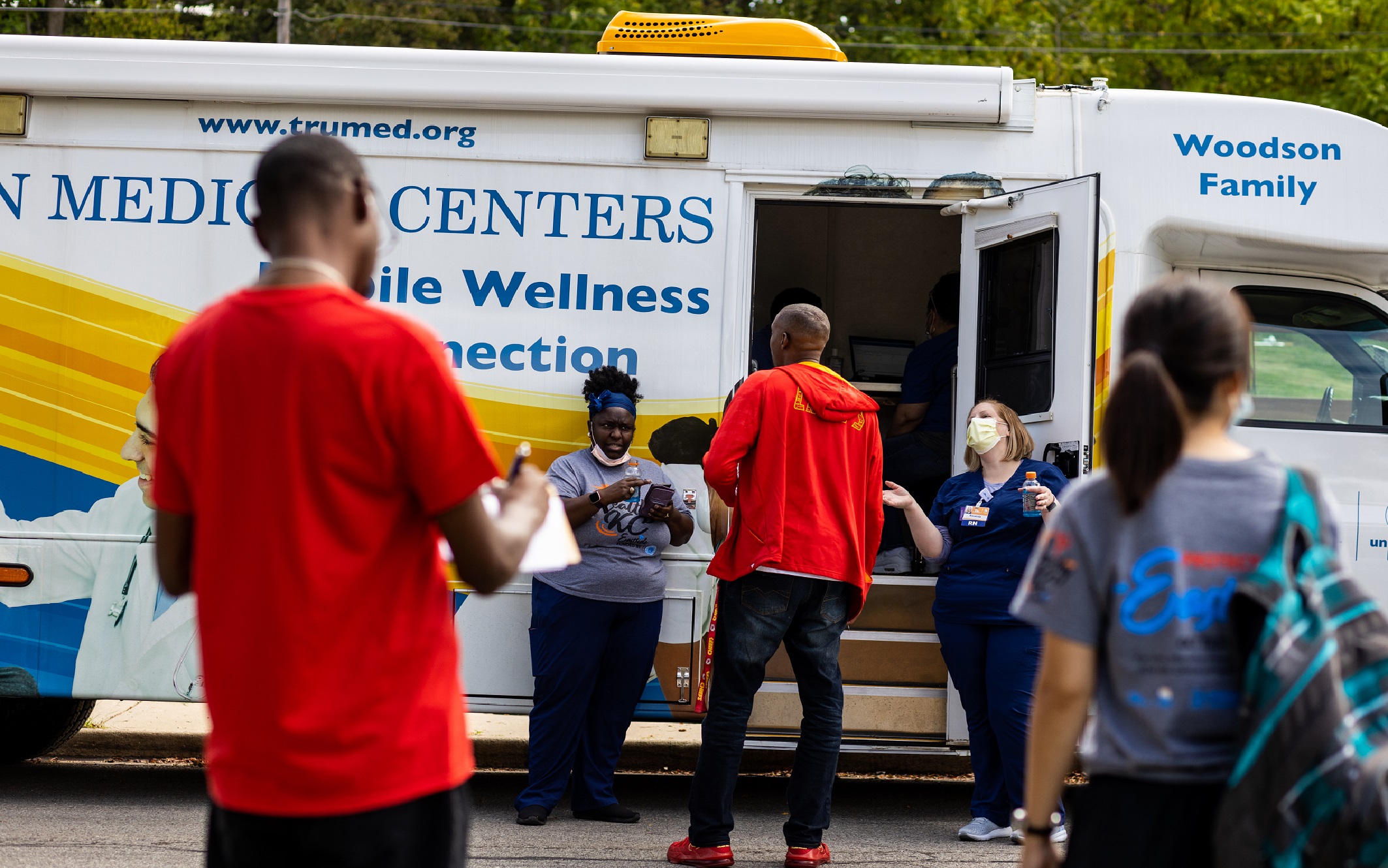
UMKC hosts discussion about facts and perceptions around vaccine hesitancy and availability for people of color
Community health leaders participated in a panel discussion on, “COVID-19, Vaccinations and (MIS)Information in Communities of Color.”
The Nov. 16 discussion was the tenth in the Critical Conversations series of panel discussions addressing systemic racism sponsored by the UMKC Division of Diversity and Inclusion. It was the second of the 2021-22 school year.
The Critical Conversations series is a part of Roos Advocate for Community Change, a campus-wide initiative launched in June 2020, which highlights thoughtful action on campus and in our community to ensure lasting and comprehensive changes. The goal of each Critical Conversation discussion is to enlighten, educate and explore the causes and potential cures for racism. Attendance to the discussions is free.
Panelist for this session included:
Jannette Berkley-Patton, Ph.D., professor, department of biomedical and health informatics, UMKC School of Medicine, and director of the UMKC Health Equity Institute
Liset Olarte, M.D., division of infectious disease, Children’s Mercy Kansas City
Qiana Thomason, M.S.W., president/CEO, Health Forward Foundation
Frank Thompson, interim director of health, Kansas City Health Department
Excerpts of the conversation are below. To view the complete recording of the conversation, click here.
History of mistrust in the health care profession by people of color
Olarte: Mistrust in the healthcare system stems from historical events related to discriminatory practices that have impacted communities of color that may continue to this day. The most known example of unethical experimentation in health care is the Tuskegee syphilis study which lasted 40 years. It ended in the in the 70s, so not that long ago.
This study targeted about 600 black men with and without syphilis, conducted by the U.S. public health service and the Tuskegee Institute. The study examined the natural course of the infection of syphilis in the participants, but they were not informed of the real purpose of the study. And what is more concerning is that once penicillin became the standard of care, the participants were not offered treatment. Syphilis can cause permanent neurological and cardiac damage, and can be potentially life threatening. This experiment has deeply impacted the relationship between the black community and the healthcare system.
Solutions in improving and tracking chronic condition management
Thomason: It's time for us to begin to look at the disparate outcomes that result in health injustices, and it's time for our states - Missouri and Kansas - and our Federal Government to require the use of race, ethnicity and language data, so that we can ensure that we have the full picture. We cannot change what we cannot measure.
Providing healthcare where people are
Thomason: We’ve seen that the best and most promising practices here locally, as well as nationally, focus on connecting underserved communities with health care services through channels that offer proximity and trust, like our faith-based communities.
UMKC role in furthering virus information and vaccination
Thompson: The UMKC group that Jeannette Berkeley-Patton heads, has access to a faith-based network that targets the populations [in Kansas City] that are the most underserved in terms of vaccine access and distribution, and have been the hardest hit in terms of cases. One of the things I’m the most excited about is that the federal grants that allow us to get out and work with community organizations that not only work with COVID awareness, but also around developing their own organizational capacity.
Improving overall health through community connection
Our medical system is set up to treat sick people. When you’re really talking about improving health, you need to talk abut relationships, so we need to think about how we restructure our medical systems. COVID is a really good litmus test. With COVID, more than ever before, we saw health services being pushed into the communities where people live.
Nov 18, 2021
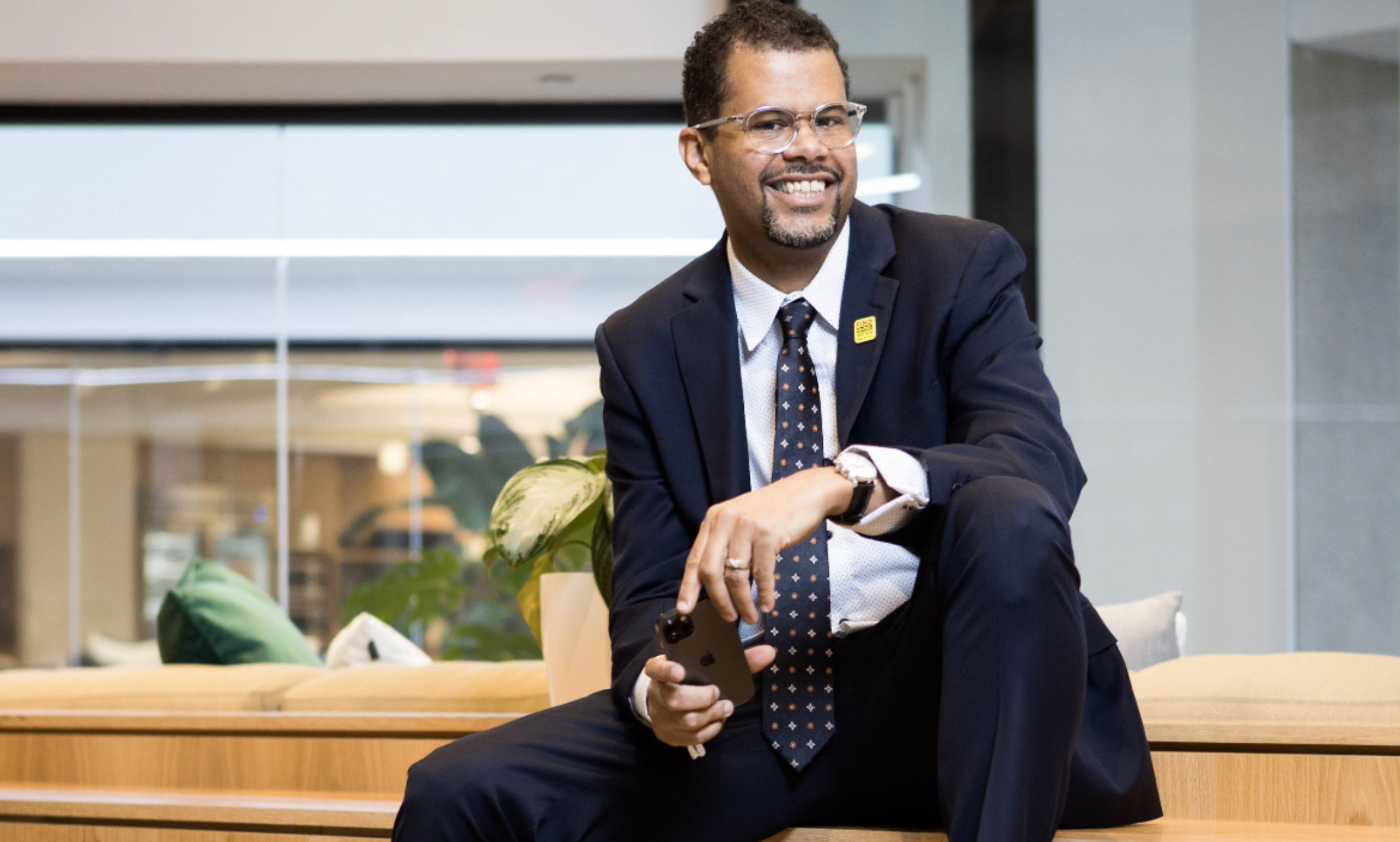
Hogan Family Scholarship supports Kansas City Public Schools graduates enrolled as Business majors
“Redefining Potential” is the theme of the new Hogan Family Scholarship Fund at the University of Missouri-Kansas City.
It’s a subject Nate Hogan knows well, because it’s essentially the story of his life.
Hogan serves as chair of the Kansas City (Missouri) Public Schools (KCPS) Board of Education. He and his wife, Felecia, endowed the fund to support KCPS graduates of color who enroll in the UMKC Henry W. Bloch School of Management. Hogan holds an Executive Master of Business Administration degree from the Bloch School.
His route to a master’s degree was hardly a typical one; that road began with his decision to drop out of his Florida Keys high school in 10th grade (the only year he lived outside of Kansas City). Today, he is Vice President, Healthcare Solutions for NIC Corp. in Olathe.
The scholarship is designed to support and inspire young people who face similar hurdles to those he overcame.
“My high school grades were terrible,” he admits. “Nobody would have offered Nate Hogan a scholarship.”
The Hogan Scholarship has no GPA or standardized test score barriers.
“Why look at every kid through the lens of standardized tests?” he said, noting that such tests also heavily influence high school GPA. “It’s not a really good predictor of a person’s potential.”
The scholarship program is designed to ensure every student who wants to go to college, has an equitable opportunity to do so. The $2,000 annual scholarships are intended to supplement the Pell grants and other financial aid these students typically receive – and serve as a motivating force.
“We want to tell these kids, ‘you have a real opportunity here,’ and help them understand that they can ignore all the noise going on in their lives, all the noise going on in society, and think about how they can dig deep and tap into their full potential,” Hogan said.
Nate and Felecia started the scholarship fund with an $8,000 contribution, and have committed to make that same donation on a yearly basis. Additional fundraising has added another $2,000 to the fund, and the Hogans plan to step up their personal involvement in fundraising for the scholarship in future years.
The focus on business education is also based on the Hogans’ personal journey.
“Our entire careers have been business-focused,” Hogan said. They met at Commerce Bank – Nate’s first job outside the service industry – where today Felecia serves as senior vice president and director of diversity, equity and inclusion. Nate has served in a variety of business roles before taking his current position at NIC, crossing just about every major business discipline (accounting, finance, sales, relationship management, operations and leadership).
“We believe a business degree can be a great foundation no matter what you end up doing in your career,” he said.
Ultimately, Hogan’s motivation for setting up the scholarship fund is the same as what drove him to become a leader for the city school district.
“Because I was a very mobile student who came to school carrying a bunch of stuff that no child should have to take on, I can identify with our students.”
Oct 28, 2021
Best colleges in Missouri
The University of Missouri-Kansas City was listed at #7 on their list of the best colleges in the state, according to Niche. Read more.
Oct 28, 2021
Hair-raising stories surround UMKC’s Epperson House
When you look at the old, abandoned Epperson House on the UMKC campus, it’s easy to imagine how it might have looked in the last century. Chris Wolff is a campus employee and a major history buff. He gives tours of the campus and one of his favorite stops is the Epperson House. Read more.
Oct 28, 2021
Six universities on Best Global University list, including UMKC
Six Missouri universities have landed on U.S. News and World Report’s list of Best Global Universities. The University of Missouri-Kansas City scored in the 65th percentile. Read more.
Oct 28, 2021
Students getting $218 million from $496 million in federal pandemic funds awarded to Missouri public universities
The University of Missouri-Kansas City is allocating over $18 million for student financial aid from CARES Act Higher Education Emergency Relief Funds. Read more.
Oct 28, 2021
Kansas City rocks! Take a geological journey across the region
Richard Gentile, professor emeritus from UMKC, explains this history in a recorded series of lectures on local geology from Linda Hall Library in early 2020. Read more.
Oct 27, 2021
Charting a new course, plug artist collaborative opens a gallery in the former Agnes Avenue police building, where it joins a complex of artist stu...
“plug has a really great reputation for showing contemporary art in Kansas City,” said Davin Watne, who teaches art classes at the University of Missouri-Kansas City and runs the UMKC Gallery of Art. “Who better to move into that space? It’s not as large square footage-wise as what they had before, but it’s got a much higher ceiling. It’s a unique kind of space that they can have a lot of control over.” Read more.
Oct 27, 2021
Kansas City leaders consider declaring a climate emergency. Here’s what it would mean
A research group led by the University of Missouri-Kansas City will collect data this summer in an effort to find out who suffers the most in Kansas City’s heat. Read more. (subscription may be required)
Oct 27, 2021
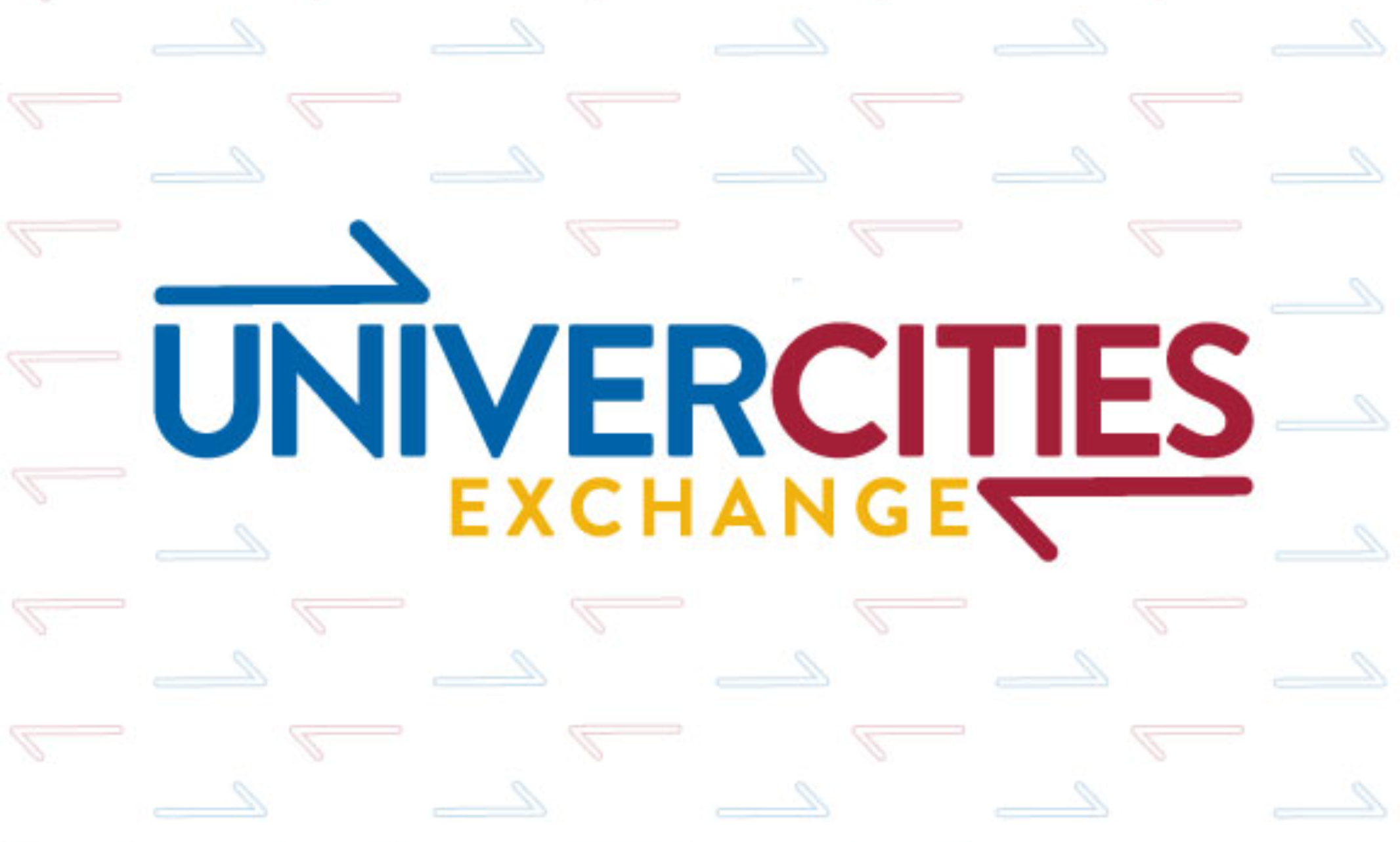
UniverCities Exchange is a continuing collaborative of UMKC and UMSL.
Academic and community leaders from Kansas City and St. Louis met virtually on Oct. 13 to discuss issues local adolescents have faced throughout the COVID-19 pandemic.
The session was conducted through UniverCities Exchange, an ongoing collaborative project between UMKC and UMSL. In this installment, the panel discussed how Missouri youth are adjusting to the complexity of nearly two years of life in the era of COVID-19.
Between March and May of 2020, the United States saw a nearly 25% increase in appointments for children ages 5-11 experiencing a mental health emergency, and a 31% increase for children ages 12-17. This year, those numbers have climbed an additional 15%.
The panel discussed how Missouri youth are adjusting to the complexity of nearly two years of life in the era of COVID-19.
Steve Kraske, host of KCUR's Up to Date and UMKC journalism professor, served as moderator. Panelists included:
Nora Peterman, UMKC Assistant Professor of Education
Erika Gibbs, Dean of Primary School, Citizens of the World Charter School, Kansas City
Dr. Jerry Dunn, Executive Director, Children's Advocacy Services of Greater St. Louis
Dr. Tyler Smith, Fellowship Program Director, Divison of General Academic Pediatrics, Children's Mercy Kansas City
Rachel Taube, Project Director for Mental Health First Aid, Missouri Institute of Mental Health
Here are some highlights of the panel's conversation regarding the problems youth in Kansas City and St. Louis fae and how our communities are addressing them.
Please note: This conversation features content that some may find upsetting- including conversations on abuse and suicide. We encourage those who need help for themselves or a loved one to seek it out. The UM System assists in providing free Mental Health First Aid training and, for those in crisis, the National Suicide Prevention Lifeline is available 24/7 at 1-800-273-8255.
"The pandemic has certainly had an impact on the mental health of the generation that is moving into and through adolescence right now. As we look at statistics, they are documenting only the surge in mental health emergencies. But what we have to keep in mind is those health emergencies really represent only the tip of the iceberg and that we have a far greater proportion of our youth who are underneath that tip of the iceberg, whose functioning and overall well-being has been significantly impacted." -Jerry Dunn
"Online spaces and online communities have become even more meaningful and significant in the daily lives of adolescents than ever before. Whether we're talking about TikTok, gaming websites, fandom communities, these are all spaces online where adolescents are engaged in this constant process of figuring out who they are, can audition different identities and make connections with other people who can help them figure it out." -Nora Peterman
"We have to look at what's happening currently in our society. In addition to young people dealing with a pandemic, there was also a heightened awareness of racial and social injustice and reckoning. There were young people who were seeing on a TV screen, a gentleman literally dying before their eyes and that is very traumatizing and traumatic for young people to have to experience." -Tyler Smith
"We really try to make sure that we emphasize self-care, make sure that they have support throughout the day whenever they need things, bathroom breaks, because the burnout is real. There's been an extreme amount of pressure." -Erika Gibbs
"There are lots of ways to help. We know that oftentimes when adolescents experience mental health challenges, they talk to their peers, but we also know that they go to family members and friends. So it's important for lots of folks to be able to respond." -Rachel Taube
UniverCities Exchange gathers community leaders and academic experts to discuss problems and possible solutions to issues affecting the Kansas City and St. Louis metro areas. The project began in fall 2020 with a discussion of health disparities during the COVID pandemic. The goal of these conversations is to foster a connection for future collaboration across Missouri.
Watch the full UniverCities Exchange discussion below:
Oct 26, 2021
FDA advisers vote to authorize the Pfizer vaccine for children aged five to 11
“Our kids are going to be dealing with this virus for many years to come,” said Jay Portnoy, professor of pediatrics at the University of Missouri-Kansas City School of Medicine. “Getting the vaccine is just the first step that they’re going to take towards being able to protect themselves.” Read the full article.
Oct 26, 2021
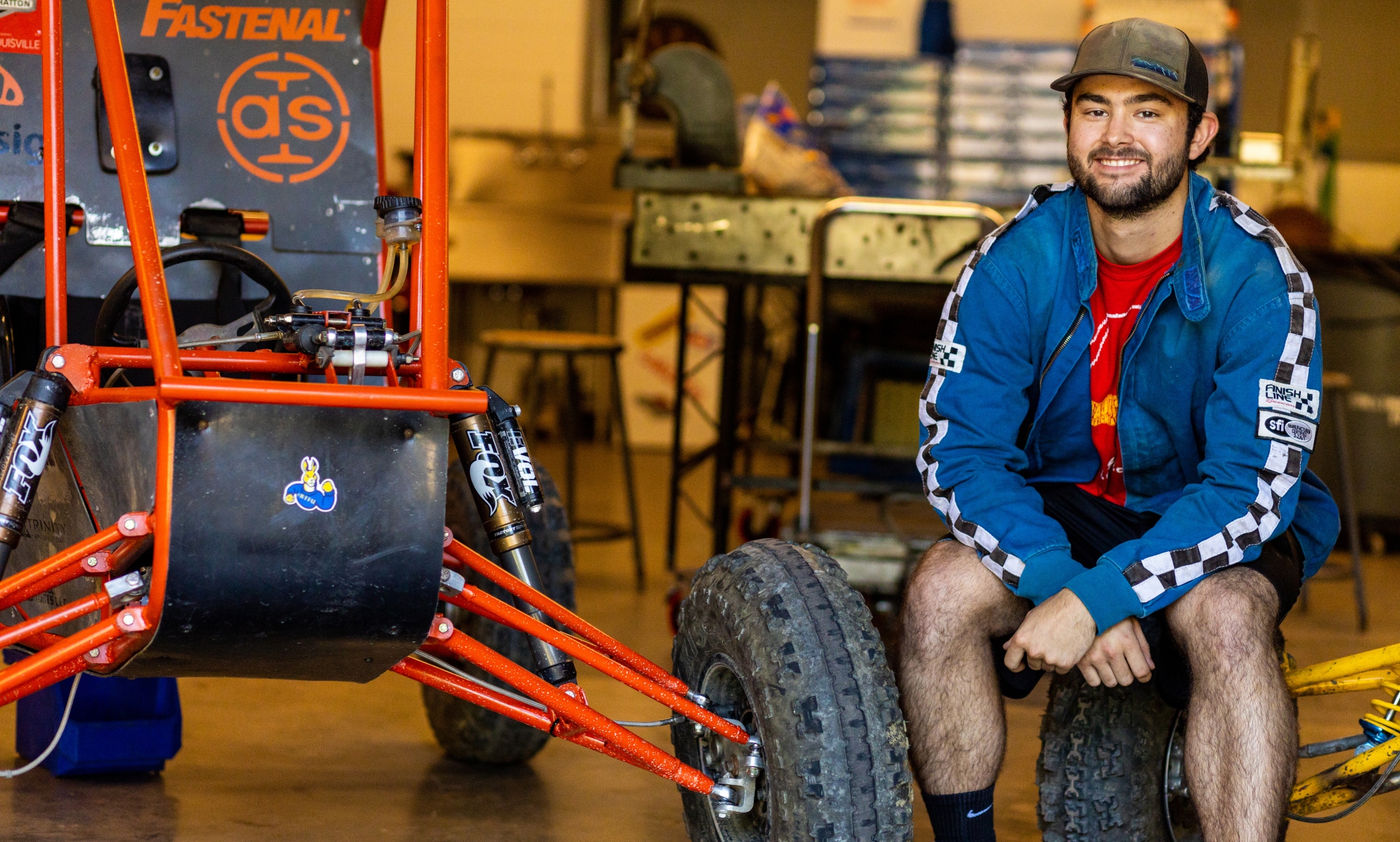
Layton Streck has a drive to succeed
Our ongoing story starts with people from around the world, converging here at UMKC. Get to know our people and you’ll know what UMKC is all about.
Layton StreckAnticipated graduation year: May 2023UMKC degree program: Mechanical EngineeringHometown: Pilot Grove, Mo.
Why did you choose UMKC?
UMKC has so much to offer. Being located in the heart of Kansas City, surrounded by multiple businesses where I could make connections, I saw myself reaching my fullest potential.
Why did you choose your field of study?
Mechanical engineering was a pretty perfect choice. I had always enjoyed being around cars and machines since I was young. I loved working with my hands and understanding how and why things were built. The field is broad enough that I can explore different avenues, whether it is manufacturing, power, HVAC, you name it.
What are the challenges of the program?
The whole program is a challenge! I am constantly studying and figuring out how to balance sleep and other things, but most of the time studying wins.
What are the benefits of the program?
Through this program I have learned the value of collaboration. In engineering it requires a team effort of everyone’s input and ideas to see which is best. I have learned time management, as well as that one bad grade won’t hurt me for the rest of my life.
"Through this program I have learned the value of collaboration."- Layton Streck
How has your college program inspired you?
It has inspired me to understand more of what I can achieve. Though it is tough in the moment, I have grown a lot as an individual.
What other extracurricular activities are you involved in at UMKC?
I am heavily involved in Baja SAE, an intercollegiate design series run by the Society of Automotive Engineers. It is a competition where teams of students from universities design, build and then compete with small off-road racing vehicles. It has given me the opportunity to get hands on engineering experience during my education.
Since entering college, what have you learned about yourself?
Being in college has taught me there are great benefits that come with hard work, whether that is with the Baja Buggy competition, grades or health. I have learned that things go right when you put in effort.
Who do you admire most at UMKC and why?
I admire the older Baja members because they create relationships with the new members by helping with latest ideas and designs. And at some points they help with classes if needed, too. It creates a mentoring environment and helps each member be the best they can be. You can usually point out our older members by their choice of hairstyle - the timeless mullet.
"I hope I will be able see everything that I learn from the time and experience at UMKC in my day-to-day work life."
What do you hope to take from your experiences at UMKC into your professional career?
I hope I will be able to take everything that I learn from my time and experiences at UMKC into my day-to-day work life. The biggest skills UMKC has helped me develop are my communication skills and teamwork mentality.
What is one word that best describes you and why?
Productive. I like to constantly be doing something to help move the project along. Even though sometimes that means not sitting on an idea all the way through, at least I have something to show. My Baja teammates would agree.
More About Layton
What’s your favorite social media channel and why?
Instagram is my favorite. It gives me a chance to connect with other Baja teams worldwide and see how they tackle common engineering challenges and on events outside the competition that are put on by SAE.
What’s your favorite spot to eat in Kansas City?
If I had to pick one spot it would be Parlor in the Crossroads art district, just because it houses many different places to eat in the same building.
Where’s your favorite spot to hang out in Kansas City?
My favorite spot is Westport. It gives a chance to meet with others easily and sometimes network with new sponsors for the team and potential members.
What’s your favorite spot on campus?
My favorite spot is the Baja shop in the brand-new Plaster Engineering building. I spend most of my free time there, as well as socialize with my friends from class.
Oct 25, 2021
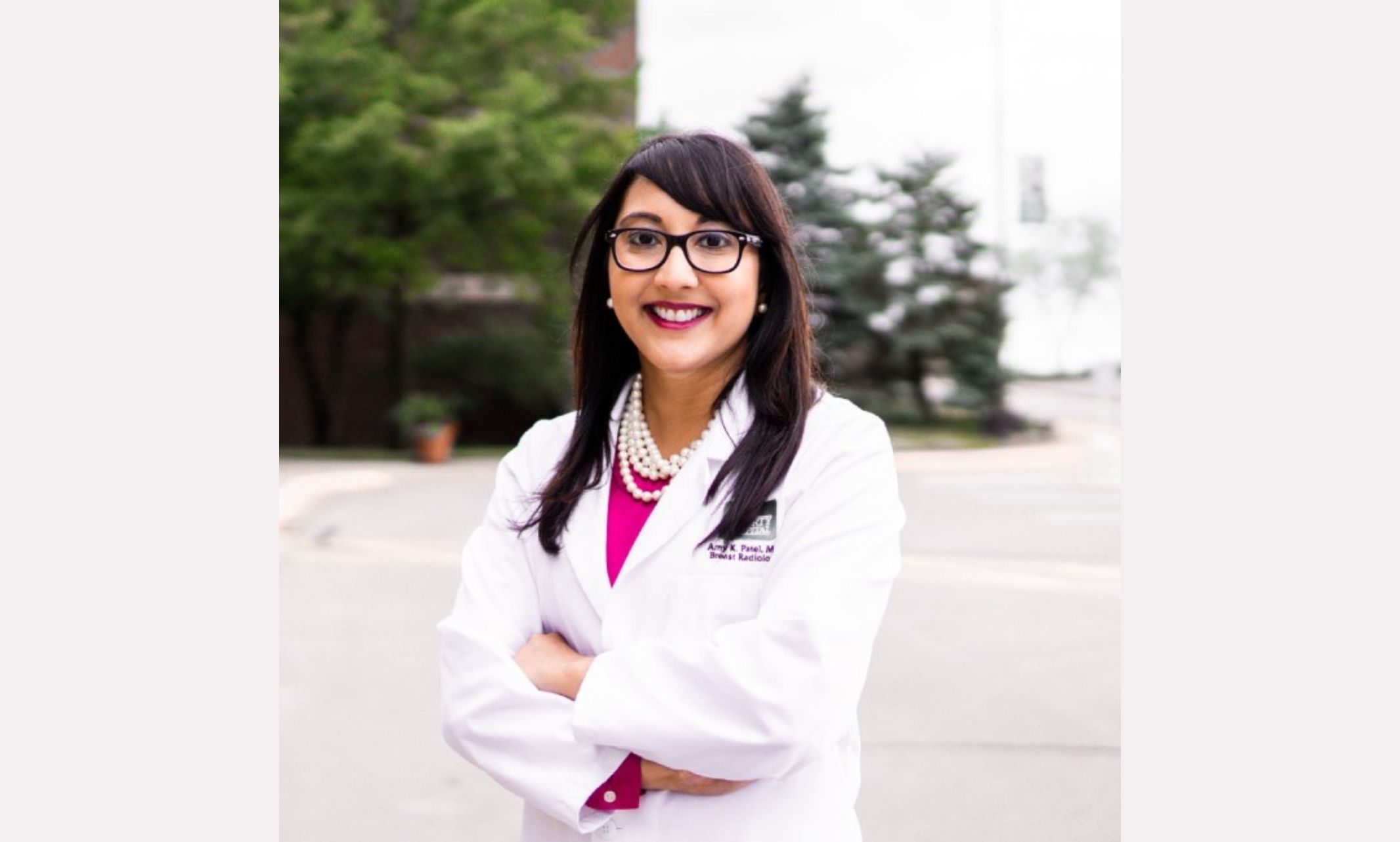
Dr. Amy Patel leads KC area Breast Care Center while mentoring students at alma matter
Growing up in Chillicothe, Missouri, a town of fewer than 10,000 people, Amy Patel didn’t see many physicians that looked like her.
“There was only one primary care woman physician in my hometown and there weren’t any women who looked like me, a woman of color. From a young age I realized there was such a need for women practicing specialized care, but especially for women of color,” Patel said.
That observation sparked a fire and passion in Patel that has continued to grow. Patel went on to study medicine at the University of Missouri-Kansas City and graduated from the school’s six-year medical program. During medical school she completed a rotation with a breast radiologist at Washington University in St. Louis, which was a turning point in her decision to specialize in breast cancer radiology.
After completing a breast imaging fellowship at Washington University, Patel began her professional career in Boston, and even found time to work as a faculty member at Harvard. But eventually, Patel felt called to return to Missouri.
“I always wanted to come back to the Midwest to assume a leadership position where I could make a difference and make an impact,” Patel explained.
In July of 2018 Patel was named medical director of the Breast Imaging Center at Liberty Hospital. Since her arrival she’s helped grow the program, adding an additional breast imaging specialist, starting a plastic surgery program and partnering with the UMKC School of Medicine to launch a Breast Radiology elective course. Patel teaches the course, which involves a rotation designed to introduce medical students to a range of screening and diagnostic breast imaging modalities to multidisciplinary care. She hopes this course will help others, especially women and minorities, become more interested in the profession.
“The percentages of women entering the radiology field have remained around 27% a year, and those numbers for underrepresented minorities are even lower. Right now, there are so many opportunities for students and I’m hopeful in the future, we will start to see growth in the percentages that have remained stagnant for many years,” Patel said.
In addition to helping launch the new rotation, Patel says one of the initiatives she’s most excited about is a newly launched genetics program within Liberty Hospital.
“Knowing your family history is very important because that could potentially warrant genetic consultation and then possible testing. That is why it's so important for a hospital system to have a genetics program and that's why we’ve worked really hard to have one here,” she adds.
While familial genetic indicators may be out of our control, Patel says everyone can proactively take steps to lower their risk of breast cancer.
“A healthy diet is important, maintaining a body mass index that is within recommended limits is key because we know obesity is a risk factor for breast cancer. Moderate alcohol consumption and not smoking are also important ways to lower your risk,” Patel said.
Regular screenings are also key in the fight against breast cancer. Patel says screening rates among women plummeted into the single digits during the pandemic due to the pause of routine screenings in Spring and early Summer of 2020 under advisement of the CDC. While the numbers have started to rebound, they’re still down about 13% compared to pre-pandemic.
“I always wanted to come back to the Midwest to assume a leadership position where I could make a difference and make an impact." — Amy Patel
“We are particularly worried about women of color, who tend to be the ones with more barriers when it comes to access and education. If screening rates don’t pick back up, we are worried that disparity could widen even further so it's really going to take the entire breast cancer community to come together and encourage patients of all backgrounds to get screened,” Patel said.
Patel says October is a good time to get screened and encourage friends and family to do so as well.
“Breast Cancer Awareness Month is not just about raising money for research; the awareness component is equally as important, and I love to see specialists coming together and encouraging others to go and get your mammogram.”
Oct 22, 2021
Maryfrances Wagner shares excitement about her prestigious nomination
Roos do amazing things, including earning one of the highest literary honors in the state.
Maryfrances Wagner, a UMKC alumna, was appointed to the position by Missouri Governor Michael Parson in July of 2021.
The blue and gold roots with Wagner go deep. After graduating with her bachelor’s and master’s degrees from UMKC, Wagner taught English for most of her career, including here at the university. During that time, she earned both local and state recognitions for Excellence in Teaching. In 2002, she became the English Coordinator for the High School College Partnership, a dual credit program, at UMKC. During those years, Wagner served on the composition committee, coordinated in-service programs on campus, wrote the composition handbook, and mentored thirty UMKC English teachers.
In addition, she is co-editor of the literary magazine I-70 Review and has served as President of The Writers Place where over the years, she has sponsored literary-based events throughout the community to include a number of programs that brought together poetry, music, and dance through improvisation. She has also served as Secretary on the Board of Directors for Kansas City Creates, which sponsors the annual Fringe Festival.
Wagner is teaming up with fellow UMKC alums to create opportunities for current students exploring literary career fields at her alma matter
“In 1988, my husband [Greg Field, MA from UMKC] and I, along with Robert Stewart (MA from UMKC), established the Crystal Field Scholarship fund, a scholarship that goes to a UMKC creative writing student, and we still oversee that as well as have an annual scholarship reading as a fundraiser where professional writers help support emerging student writers.”
Her journey as a poet, however, began long before her time at UMKC. She says, “When I was a child, my mother used to write little poems. She’d put them in our lunch bags, our suitcases, my brother’s duffel bag or on our pillows when we’d accomplished something significant. My father also wrote little poems in cards he gave to my mother.”
In eighth grade, a teacher assigned students to write about a particular topic, and her parents suggested she write a poem instead of an essay. That was her first foray in the art, and that passion would continue into her college years where she took creative writing classes to learn more about the craft.
Wagner says, “For the longest time I only showed my poems to friends, but my creative writing teachers encouraged me to try sending some poems out for publication, and after that, I kept on taking classes.”
She went on to publish nine collections of poetry, the latest The Immigrants’ New Camera. In 2020 she served as Missouri Individual Artist of the Year, the only writer to have received that award. In 2021, Wagner was nominated and appointed to serve as Missouri’s Poet Laureate
“I have always been a strong advocate for the writing community,” Wagner said. “This role will give me the opportunity to help promote other Missouri writers. It will give me the opportunity to try to reach out there to people less familiar with poetry or even to people who think they don’t like poetry, and hopefully, after the pandemic is over, I’ll be able to do more workshops, readings and events around the state.”
Wagner is Missouri’s sixth poet laureate. Her two-year term started July 1 and runs through June 2023.
You can read and hear Wagner’s work in a variety of places. She’s hosting a series of podcasts with other Missourian poets. You can also purchase her collections on Amazon, Barnes and Noble or visit her on her website.
Oct 22, 2021
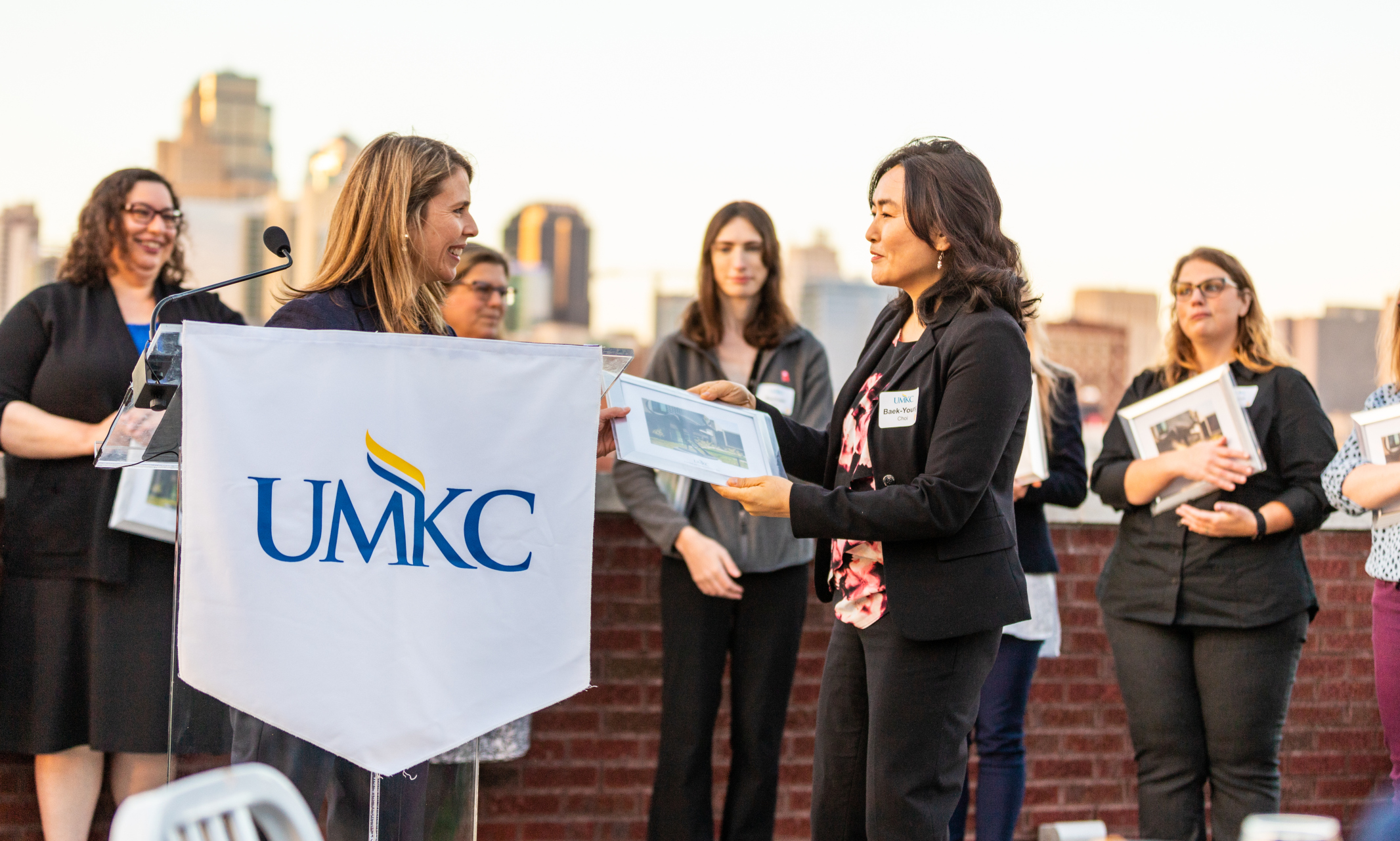
Chancellor cites ‘remarkable level of academic achievement’
UMKC celebrated the promotion and tenure of more than 30 members of its faculty Oct. 21 at a gala reception set against the city’s glittering skyline at the On Broadway event space.
“Each year, this promotion and tenure event is a celebration of achievement. Today, however, we are recognizing and celebrating a remarkable level of academic achievement,” said Chancellor Mauli Agrawal. “The operational and financial challenges posed by the pandemic came in tandem with enormous disruption in our personal lives.” He added that in the midst of those challenges, faculty also played a key role in the development and launch of the UMKC Forward initiative.
“Making your way through all that, in one piece, is a bragging point all by itself. But remember – in the midst of all those challenges, you have successfully pursued the path of professional growth and achievement that resulted in the promotions, and granting of tenure, that we celebrate tonight,” the chancellor said. “Think about that, as you stand here this evening, in October of 2021, and look back over the past several years at what you have achieved through this unique moment in history. Be proud. UMKC is proud of you. I am proud of you. You have proven yourselves to be truly exceptional.”
The event was set outdoors for the comfort and safety of the faculty members and their guests in the midst of the ongoing pandemic. The event also was focused solely on promotion and tenure. Other faculty awards and honors – such as new Curators’ Distinguished Professors, and Trustees’, Governor’s and Chancellor’s awards for research, teaching, mentoring, community engagement and commitment to diversity and inclusion – will be presented at a separate event in the spring semester.
“Our goal was an event that would be smaller, but still very special, as all of you deserve,” said Provost and Executive Vice Chancellor Jenny Lundgren. “I hope that comes through loud and clear.”
The promotion and tenure process at UMKC involves a lengthy and rigorous review of academic performance in the areas of teaching, scholarship and service. Each of the academics recognized at the celebration has demonstrated to their peers and to the administration that they have met high standards for sustained contributions and outstanding performance.
UMKC 2021 Promotion and Tenure
Ekaterina Strekalova-Hughes, School of Education, tenure with promotion to associate professor
Megan Hart, School of Computing & Engineering, tenure with promotion to associate professor
Sue Lasiter, School of Nursing and Health Studies, tenure
Joah Williams, College of Arts and Sciences, tenure with promotion to associate professor
Alison DeSimone, Conservatory, tenure with promotion to associate professor
LaVerne Berkel, School of Education, promotion to professor
Mike O'Connor, School of Biological and Chemical Sciences, promotion to professor
Viviana Grieco, College of Arts and Sciences, promotion to professor
Shannon Jackson, College of Arts and Sciences, promotion to professor
Baek-Young Choi, School of Computing & Engineering, promotion to professor
Xiaobo Chen, School of Biological and Chemical Sciences, promotion to professor
Elizabeth Vonnahme, College of Arts and Sciences, promotion to professor
Jennifer Huberman, College of Arts and Sciences, promotion to professor
Kym Bennett, College of Arts and Sciences, promotion to professor
Jacob Marszalek, College of Arts and Sciences, promotion to professor
Toya Like, College of Arts and Sciences, promotion to professor
Jasmine Abdel-Khalik, School of Law, promotion to professor
Del Wright, School of Law, promotion to professor
Dan McIntosh, College of Arts and Sciences, promotion to professor
Gary Abbott, Conservatory, promotion to professor
Lance Godley, School of Dentistry, promotion to associate clinical professor
Michael Murphy, School of Dentistry, promotion to associate clinical professor
Lynn Friesen, School of Dentistry, promotion to research professor
Heather Lyons-Burney, School of Pharmacy, promotion to associate clinical professor
Lisa Cillessen, School of Pharmacy, promotion to associate clinical professor
Kendall Guthrie, School of Pharmacy, promotion to associate clinical professor
Steven Kraske, College of Arts and Sciences, promotion to teaching professor
Crystal Doss, College of Arts and Sciences, promotion to teaching professor
Rebecca Davis, College of Arts and Sciences, promotion to teaching professor
Mitchell Brian, College of Arts and Sciences, promotion to teaching professor
Kelley Martin, University Libraries, promotion to librarian III
Danielle Merrick, School of Law, promotion to clinical professor
Rachael Allen, School of Biological and Chemical Sciences, promotion to associate teaching professor
Aaron Reed, School of Biological and Chemical Sciences, promotion to teaching professor
Oct 22, 2021
Scenes from the pandemic: Telehealth a perfect fit for treating heart failure
“Heart failure is a particularly important disease for which to examine the impact of telehealth, as it is a chronic condition necessitating continual assessment of symptoms, health status and medication adjustment,” wrote lead author Yasser Sammour, MD, a cardiology resident at the University of Missouri Kansas City, and colleagues. “Moreover, patients with HF are a particularly vulnerable population for complications related to COVID-19 infection, including critical illness and mortality.” Read more.
Oct 22, 2021
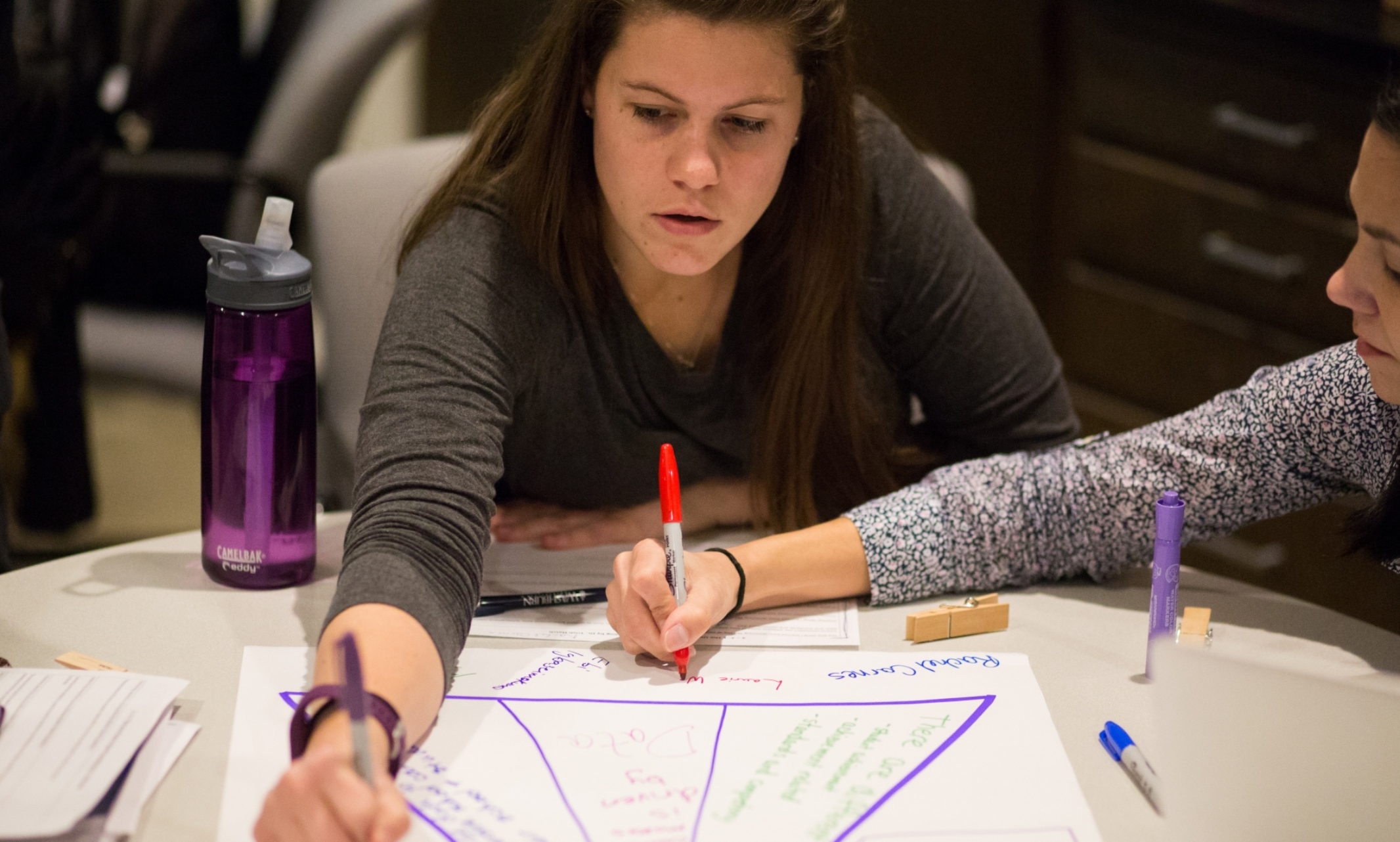
STEM curriculum offered in 163 Missouri school districts
A new study of Project Lead The Way, a curriculum which focuses on increasing students’ exposure to science, technology, engineering and mathematics skills, shows the program has significant impact in encouraging students’ long-term interest in STEM education and careers.
A new study of Project Lead The Way, a high school curriculum which focuses on increasing students’ exposure to science, technology, engineering and mathematics skills, shows the program has significant impact in encouraging students’ long-term interest in STEM education.
The research team, led by Eric Camburn, Ph.D., Sherman Family Foundation Endowed Chair and director of the Urban Education Research Center, and Karin Chang, Ph.D., associate director and associate research professor at the University of Missouri-Kansas City, studied the potential impact of the Project Lead The Way curriculum on two cohorts of Missouri high school students. Camburn and Chang conducted the study in collaboration with researchers from St.Louis University and the University of Missouri-Columbia.
Their research revealed that students who took Project Lead The Way (PLTW) classes were more likely to take dual college-credit courses in high school, graduate from high school, enroll in college and declare a STEM major upon initial enrollment than students who did not.
“We found that taking Project Lead The Way courses help students successfully graduate from high school and go on to postsecondary education,” Camburn says. “And students in historically underserved groups appear to have benefitted even more on important outcomes.”
While the initial program implementation was focused on a few schools, implementation in recent years has grown substantially. In 2005, Missouri launched the PLTW program in 10 districts and 16 schools. The program is now offered in 384 schools in 163 districts across the state and is in elementary, middle and high schools.
“We found that taking Project Lead the Way courses helps students successfully graduate from high school and go on to postsecondary education.” — Eric Camburn, Ph.D.
Camburn and his team estimate that approximately 17 percent of Missouri high schools have an active program. The team’s research included more than 145,000 first-time ninth graders, 13 percent of whom had enrolled in at least one PLTW course.
Kenny Rodrequez, superintendent of schools for the Grandview C-4 School District, has extensive experience with Project Lead The Way as a teacher and administrator. He was instrumental in expanding the curriculum into more classrooms in his district.
“I had previous experience with the curriculum before I came to Grandview,” he says. “I knew how good it was. I could see that we needed to expand the program.”
Rodriguez has facilitated expanding the curriculum from Pre-Kindergarten through twelfth grade. He thinks it’s successful in engaging students for a number of reasons.
“Number one, it’s a very defined curriculum. The lessons are mapped out in a way that teachers are able to support students at a high level. But it also provides flexibility, so they can incorporate different components at the right time.”
He says he’s seen both new and veteran teachers have positive experiences.
“It’s a great package. Veteran teachers have the flexibility they need, but there is a clear path for new teachers, too.”
Rodriguez says students often respond to the PLTW curriculum because it has a connection to the real world.
“Four years ago, I heard a group of fourth graders talking about what would happen if we had a global outbreak of [a virus.] I wish I could go back to that class and say, ‘Did you ever think that could actually happen in the real world?’”
Rodriguez was not surprised to learn the outcomes of the research on PLTW curriculum.
“There’s so much community support around this work. We can reach out and get immediate help. Teachers are so busy. That is important.”
Camburn says Rodriguez’s experience is not unique.
“We believe a reasonable implication of these preliminary findings is that widespread implementation of the program in the state is likely to help more Missouri high school students make the transition to secondary education, including college, trade and vocational schools,” Camburn says.
The Urban Education Research Center (UERC) is a research and evaluation center within the University of Missouri-Kansas City School of Education. The center works collaboratively within the School of Education, across the university and in conjunction with local partners and communities to create reliable, usable knowledge about education in urban areas.
“The Urban Education Research Center is uniquely qualified to provide exemplary research on the impact of this curriculum on student outcomes,” Carolyn Barber, interim dean, School of Education. “Dr. Camburn has devoted three decades to research on school improvement, leadership and inequalities in educational opportunity. Ultimately, we hope this knowledge promotes excellence in schooling and opportunities for residents of the Kansas City metropolitan area as well as communities across the state of Missouri.”
Oct 21, 2021
Kansas Public Radio reports on this three-day festival of the music
Hear Cooper McGuire and Alicia Willard perform Charles Ives’ ‘General Booth Enters into Heaven’ followed by a chat with UMKC Conservatory professor of music theory and composition David Thurmaier and piano professor Thomas Rosenkranz, who will do one of the Concord Sonatas. Read more.
Oct 21, 2021
Supply chain shortages could get worse before they get better
For decades, manufacturers have mostly had quick and ready access to the things they need to assemble products that people use every day. When things are running smoothly, it usually takes about three weeks to receive what they need. Now, according to UMKC professor Larry D. Wigger, Jr., the average wait time for manufacturers is 92 days.
Why Supply Chain Bottlenecks Are Keeping Home Prices Sky High - Realtor.com
Supply chain shortages could get worse before they get better - KCUR
‘What do we tell our customers?’: Labor shortage, material delays hamper home construction - Columbia Missourian
Oct 20, 2021
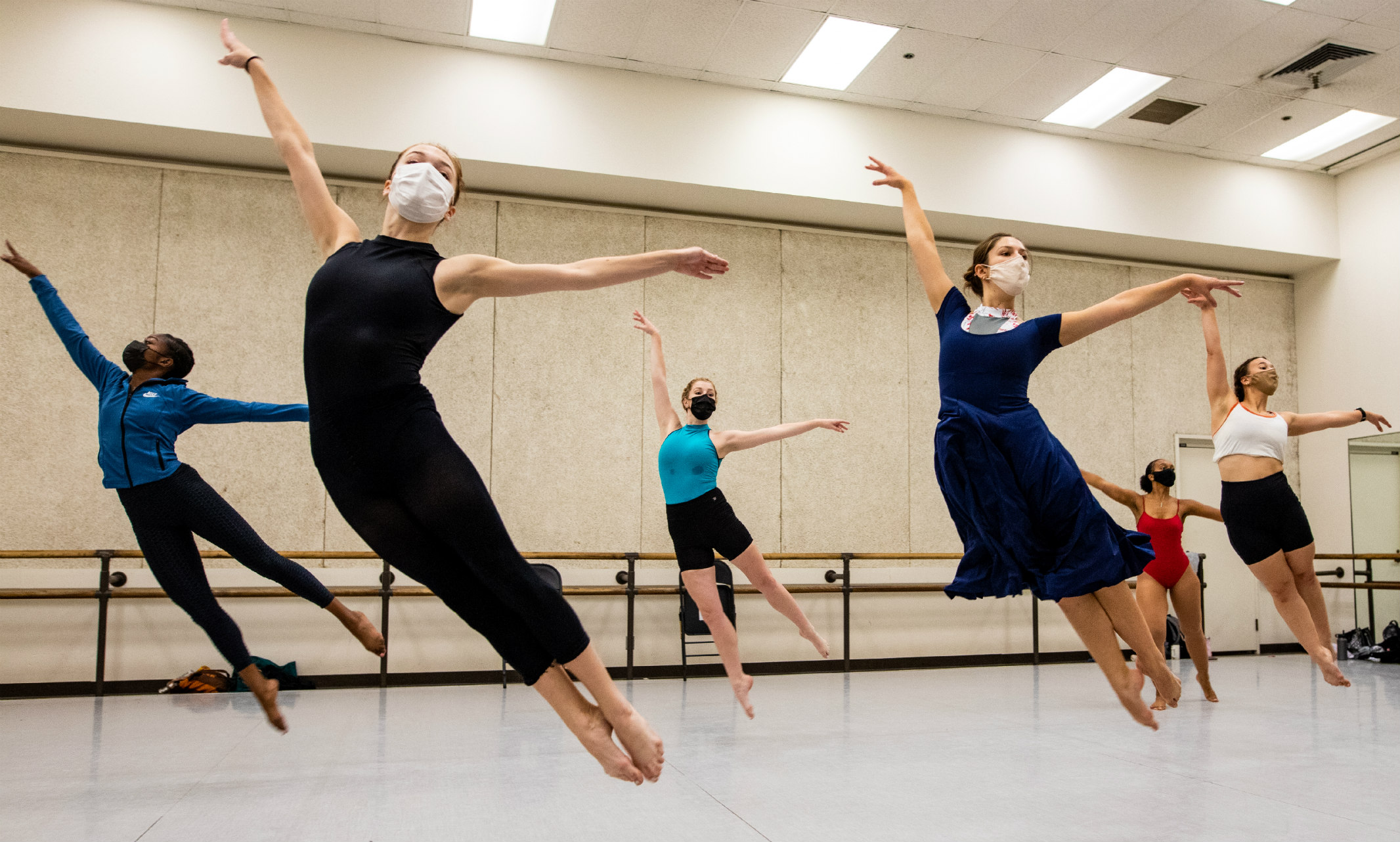
UMKC Dance brings work and art to the community
Science is the focus of the Roy Blunt NextGen Precision Health building in Columbia. But thanks to UMKC, the arts will play a significant role in the Oct. 19 grand opening event.
Kim Kimminau, Ph.D., a program lead for NextGen Precision Health, asked DeeAnna Hiett, chair and associate professor of Dance at the UMKC Conservatory to choreograph an original dance for the opening celebration.
The NextGen Building will be an anchoring facility for the NextGen Precision Health initiative, which will harness the power of the four universities in the UM System, MU Health Care, MU Extension and external partners to bring together cutting-edge research, technologies, and treatments to transform health care and save lives.
Hiett’s inspiration for the NextGen dance came from her perspective on the resilience of the human body and spirit, “We shall rise from the ashes.” The video starts somber and gets more intense throughout. In the beginning, the audience will see the dancer come from a low place in her life, struggling as she thinks back in time. Scenes will show the dancer wistfully looking out a window and walking down a busy street, oblivious to her surroundings and those around her. As the video ends, the audience watches the dancer come back to herself with a sense of encouragement to survive, creating a triumphant feeling for the audience.
“I’m hoping to give the sense of hope,” Hiett said. Everyone, regardless of their profession or place in life, overcomes struggles. And without science and doctors, Hiett said dancers couldn’t do what they do. “They keep us in operation. We’re honored, humbled and flattered to share our art with science.”
The performance Hiett choreographed for the NextGen opening is short – under four minutes. It’s an original piece with one dancer at the center of the performance. It includes nine dancers; seven are UMKC students and two are from the Wylliams/Henry Contemporary Dance Company, where Hiett is artistic director. The dancers include Ashlan Zay, senior, lead dancer; Ivyana Robinson, senior; Ashleah England, senior; Lauren Jespersen, senior; Alexa Glomp, senior; Elizabeth Lollar, sophomore; and Lecia Sims, junior. Wylliams Henry Contemporary Dance Company dancers are John Swapshire, UMKC Conservatory alumnus; and Jeremy Hanson.
The project came together quickly after Hiett accepted the invitation. She put the call out for volunteers, which was before the fall semester started. She said the first week of school was challenging because they rehearsed for two hours a day in the week leading up to the recording on Sept. 4. Four hours later, the video was shot and ready for editing and final production. Videography was provided by Ryan Bruce and Jeremy Hanson. Video editing was provided by Caroline Dahm, UMKC Conservatory adjunct professor of dance and Wylliams/Henry Contemporary Dance Company executive assistant and company member.
This isn’t the first time Hiett has said yes to creating an original dance for another discipline or for a community project. The UMKC Dance Department also collaborates with the UMKC School of Computing and Engineering and UMKC Health Sciences District schools. UMKC Dance students and faculty even created a celebration video for the Kansas City Chiefs’ return to the Super Bowl in 2021. They do these projects because Hiett, faculty and students are passionate about their craft. It’s their work. It’s their art.
“We take art and dance to the community,” Hiett said. “We love to dance, and we love to share it. So, any opportunity we have to get out in the community, of course we want to.”
Oct 19, 2021
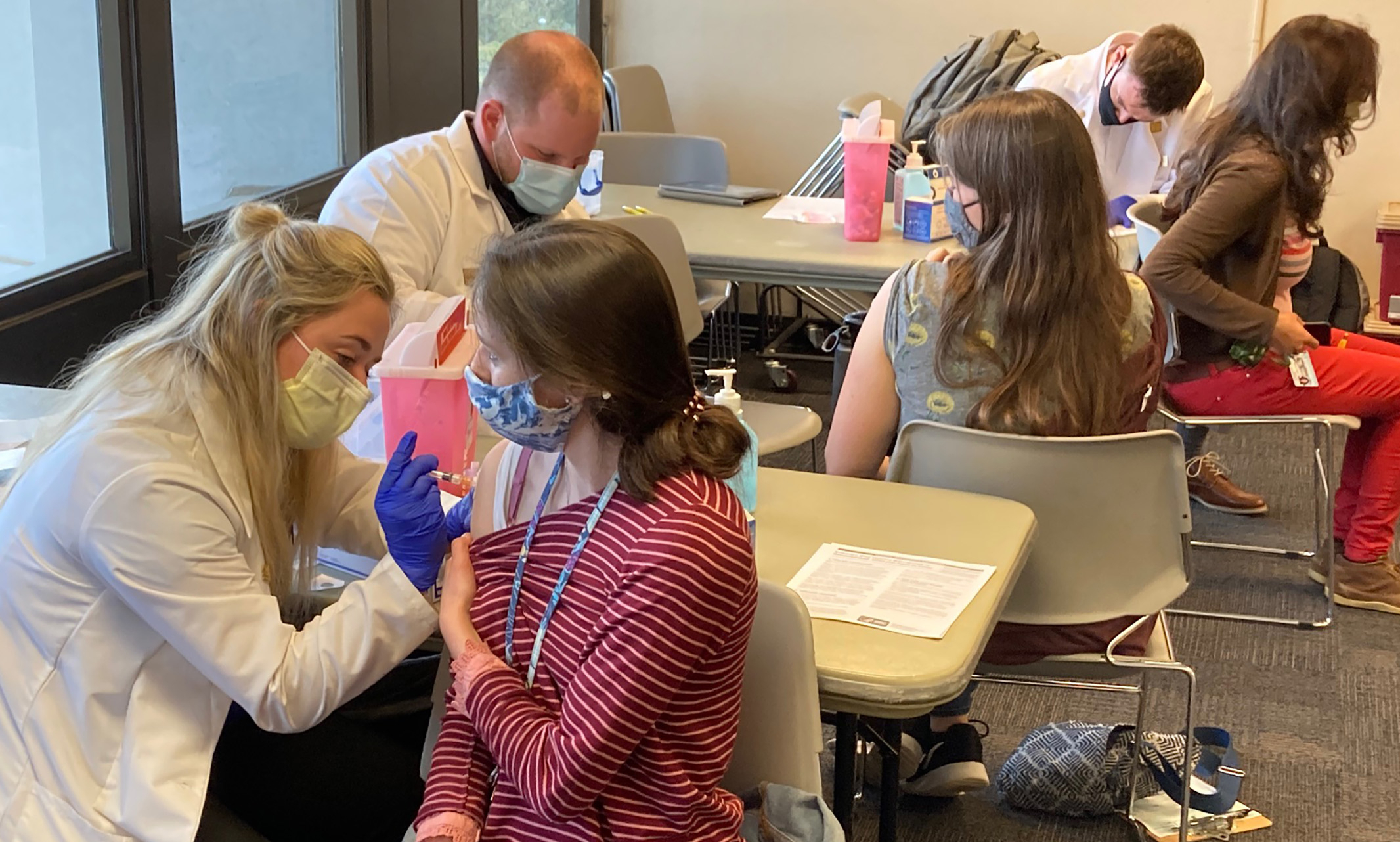
Springfield campus students, faculty are taking up a flu shot challenge
Flu season is in full swing and college students living in a campus environment that combines close living quarters with communal dining facilities and large classrooms can be particularly at risk.
That’s why UMKC School of Pharmacy students at the school’s Springfield campus are partnering with Missouri State University Magers Health and Wellness to sponsor the “Bear the Band-Aid” flu shot challenge. The campaign is meant to raise an awareness of the importance of receiving an annual flu vaccine, said Paul Gubbins, Pharm.D., associate dean for the UMKC School of Pharmacy at Missouri State University.
“We started the Bear the Band-Aid campaign in September 2016 in an attempt to increase the vaccination rates on the MSU campus,” Gubbins said. “Our effort was based on a 2016 report by the National Foundation for Infectious Diseases that noted influenza vaccination rates are typically very low on college campuses.”
The Center for Disease Control and Prevention estimates that nearly 8 percent of Americans will get sick from the flu virus each year. That means more than 26 million people developing flu symptoms.
Outreach efforts by Springfield pharmacy students included an article in a Missouri State campus newsletter where they noted that while most college students recognize the risk of flu to the very young or old, they often underestimate their own risk.
Gubbins said the initiative has met with mixed results. While a study has shown the vaccination rate on the Springfield campus to be higher than the reported rate on college campuses across the nation, there is still a need to increase awareness of the need to receive the vaccine. At the same time, among those who have been vaccinated previously, the campus campaign has created a greater awareness, Gubbins said.
“We feel it augments everything that MSU already does to make the influenza vaccine easily accessible to its students,” Gubbins said.
As of early October, nearly 2,000 employees and students on the Springfield campus had received the vaccine.
In addition to the awareness campaign, the campus pharmacy students are also active in delivering influenza vaccinations to those in Springfield and Greene County. Throughout a given flu season, Gubbins said his students will administer as many as 700 to 900 influenza vaccines throughout the community.
In Kansas City, UMKC pharmacy students have been active in administering vaccines at the university’s flu vaccine clinics in September and October. Pharmacy students from UMKC’s three campuses in Kansas City, Columbia and Springfield also collaborate with pharmacies, clinics and organizations throughout Missouri each year to typically provide nearly 3,000 flu shots to patients throughout the state.
The regional American Pharmacists Association-Academy of Student Pharmacists organization honored the UMKC School of Pharmacy in 2019 with an Operation Immunization chapter award. It recognized the extraordinary contributions pharmacists provide to improving vaccination rates in their communities. The UMKC chapter also received the national recognition in 2012.
Oct 19, 2021
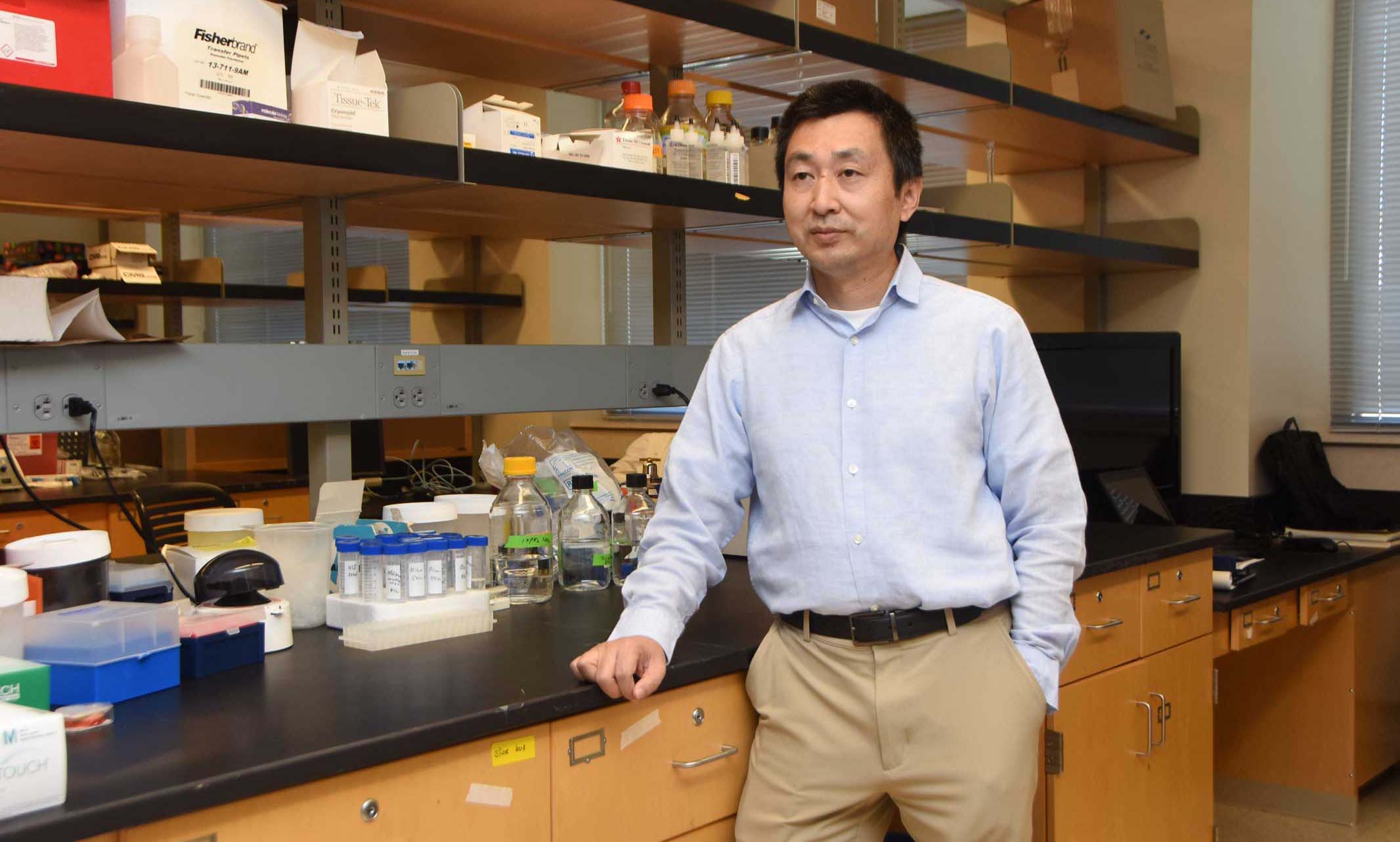
For Xiangming Zha, more labs are better than one
For Associate Professor Xiangming Zha, expanding his network for collaboration is a critical consideration for his moving to UMKC. “It’s hard for one lab to get everything done,” said Zha. “When you build up that network, your research gains more opportunities.”
That network has included a decade-long collaboration with Dr. Xiangping Chu at the UMKC School of Medicine. Now he is expanding his network to include the UMKC School of Pharmacy, where he’s joined the faculty, continuing his research focused on brain function with a general interest in neuroscience. The crux of his research centers around the study of pH – a scale used to specify acidity – in the brain that contributes to neuron function and ischemic brain injury. More recently, he has started to look at the role of pH in cerebral vascular function.
In 2004, while in his post-doctoral fellowship at the University of Iowa, he saw an opportunity in this area-of-study because of field is less explored. Prior to UMKC, he was at the University of South Alabama (USA) School of Medicine. “At USA, I was fortunate to work with a group of excellent collaborators,” said Zha. “The good thing about moving from medicine to pharmacy is that I still maintain all the previous connections. At the same time, it allows me to build new connections and thus explore new directions of research.”
That’s what has him excited about his move to UMKC School of Pharmacy. The move has additional benefits as he can lean on the school’s pharmacology and pharmaceutical researchers. He has been studying the acid-sensing ion channels and acid-sensitive GPCRs. According to Zha, there are few viable pharmaceutical options to activate or inhibit these acid receptors in the brain.
“There are a couple of pharmaceutical compounds available but none are ideal and that’s the challenging part,” said Zha. “If we have a more specific compound which can turn on and off the receptors, we may be able to better understand these acids.”
Unlocking that aspect of the research could help understand the duality of the acidity levels in the brain. Too much acid is rarely a good thing but there is recent research data that shows there may be some protective effect. To target the benefits of the acid, Zha needs to know more about the receptor and signaling involved, which aren’t well-defined yet.
These challenges have kept his research interest for the entirety of his career. Zha admits that research lives on grant funding and previous research is a key to successful funding.
“One important part for that to happen, is having good people,”said Zha.
Students and fellows interested in participating in his research efforts are encouraged to contact him.
Oct 19, 2021
UM System opens NextGen, and supporters 'can't wait for the discoveries'
Roy Blunt has been called “a champion of public higher education” for spearheading a medical student education program that raised more than $25 million for MU and the University of Missouri-Kansas City focusing on doctor shortages across Missouri. Read more.
Oct 19, 2021
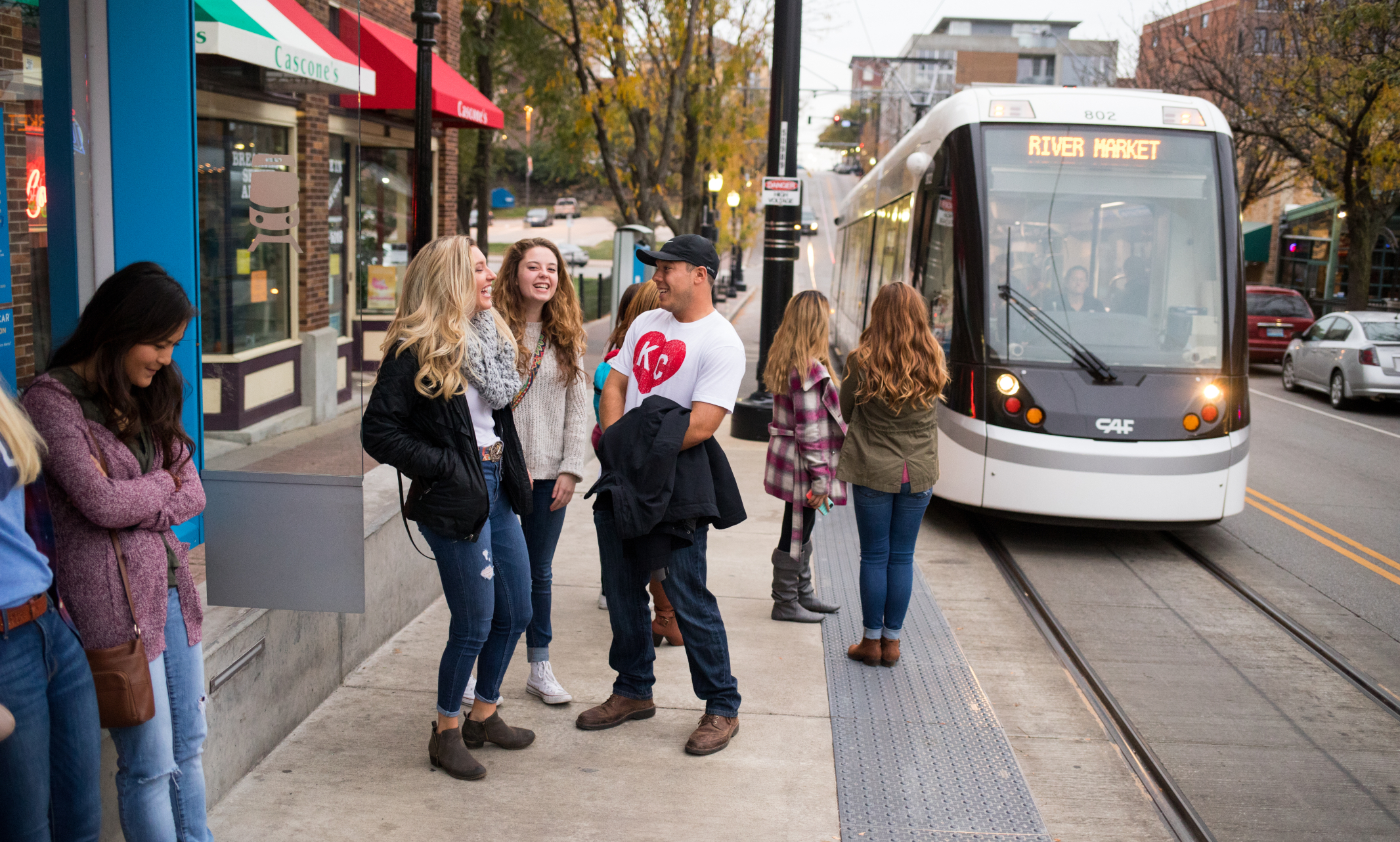
Students' plans could be incorporated in the new UMKC stop
A UMKC professor and several students had the opportunity to contribute ideas for the new KC Streetcar stop at the Volker campus.
Bill Yord, an adjunct instructor for the School of Computing and Engineering, also serves as Senior Project Manager with the Kansas City Area Transportation Authority (KCATA) and utility manager with the KC Streetcar South Extension. He is also a UMKC alumni (B.S. '01, M.S. '09).
Yord reached out to Streetcar stakeholders about UMKC senior students assisting with designs for the Streetcar's south terminus at UMKC, which is part of the ongoing KC Streetcar South Extension project.
The extension project, which has gone through planning and design by city officials since 2017 and will soon be under construction, will cover more than 30 city blocks and will extend the existing 2.2-mile 'Starter Line' to the UMKC Volker Campus, providing an exciting new access opportunity for the campus.
The UMKC Streetcar stop will be at 51st Street and Brookside Boulevard, near the former location of the Oak Place Apartments.
"I was looking at the Streetcar construction and thinking, 'We have to bring the students in on this and I called the KCATA and asked, 'Would you all be interested in involving a UMKC senior design project for the Streetcar?'" Yord said. "I got a call back in about five minutes and the answer was an overwhelming yes."
For the senior project, students were asked to study pre-existing blueprints of the UMKC Streetcar stop and come up with design concepts for the project.
"We were looking at everything: roadway design, station platform design, passenger amenities, utilities, grading and drainage," Yord said. "We would all get together and look at the designs and say 'What can we incorporate"? How can we make it better?' Then we would give those plans to the stakeholders and they would come back with suggestions and we would say, 'Okay, now how can we make this more robust?' and it went on and on from there."
Jordan Salt, a student who worked on the project, said he would walk past the stop site every day on his way to campus to "trigger" thoughts on how to do things differently.
"Knowing that this project was going to potentially contribute to a major infrastructure project made it one of the most interesting projects in my college career," Salt said. "The project's proximity to where I study and live inspired me."
Bayley Brooks, who also worked on the project, said one of the biggest things she learned while working on the project was how many people are involved in designs for city projects.
"For the Streetcar project we met with people from UMKC, KCATA, city officials, the Kansas City Streetcar Authority, the Federal Transit Authority, the Kansas City Utilities Department, I mean the list just goes on and on," Brooks said. "I enjoyed getting the chance to brainstorm creative ideas for the Streetcar stop with the group."
At the end of the semester, the students presented their preliminary design plans to a large group of stakeholders who were heavily involved in the extension. Brooks said her favorite design concept submitted was putting a kangaroo fountain at the UMKC stop.
"We are the city of fountains after all!" Brooks said.
"I ride the Streetcar all the time, so I'll be so proud to see some of our design ideas hopefully used in the stop."
Final plans for the UMKC stop are not completed, so it's too soon to tell how much of a role the students' designs will play in the final product, but Yord said he has no doubt that some of the students' design work will be implemented.
"I can confidently say that our students had a hand in making the (UMKC stop) a better place for our students, our faculty and the community to come in and come out of the university," Yord said.
The extension project, and the opening of the new UMKC Streetcar stop, is projected to be completed sometime in 2025.
Those interested in hearing more about the extension can attend the Kansas City Streetcar extension webinar from 8:30 to 10 a.m. on Friday, Oct. 22. The event is being hosted by the SCE Alumni Association and the SCE Alumni Relations Office.
The webinar will feature a moderated panel of professionals working on the streetcar extension, including Yord.
Other panelists include Tom Gerend, Executive Director of the Kansas City Streetcar Authority; Cindy Moses, Regional Engineer for the Federal Transit Administration; Jason Waldron, Transportation Director for the Public Works Department for the City of Kansas City; and Nick Stadem, Project Manager with HDR, a design and construction company.
The entire webinar can be watched here.
Oct 18, 2021
Canceled Southwest flight forces local couple to improvise
UMKC’s Russell Melchert, dean of the School of Pharmacy, was featured on KCTV 5 for his remarkable story about his trip home from Texas this weekend — which involved a UHaul truck instead of his scheduled Southwest flight. Read more and watch the newscast.
Oct 18, 2021
State Spending on Poverty Really Pays Off for Kids: Study
“Child abuse and neglect is a public health crisis, and it needs a public health response to be prevented. Pathways toward addressing poverty is one of the cornerstones, I believe, for preventing child abuse and neglect,” said lead author Dr. Henry Puls, from the pediatrics department at Children’s Mercy Kansas City, and associate professor, pediatrics, University of Missouri-Kansas City School of Medicine. Read more.
Oct 18, 2021
Rent is going up so fast, it’s not just pricing out residents — It’s hurting Kansas City
Erin Royals at the University of Missouri-Kansas City Center for Neighborhoods was quoted for this story. Read more.
Oct 17, 2021
Local news outlets report on the pandemic's effect on applications to nursing schools
The UMKC School of Nursing and Health Studies saw undergraduate applications jump by 10% since the pandemic. “They were seeing agony in their communities, in cities and they wanted to help,” Interim Dean Joy Roberts said. Read the news:
Kansas City-Area Universities See Increase In Undergraduate Applications For Nursing Amid Pandemic - KSHB
UMKC Credits COVID For Rise In Nursing School Applications - KCTV
More Applying For Nursing Programs In Kansas City During The COVID-19 Pandemic - KMBC
Oct 15, 2021
KMBC Reports: Paper publishes story exposing MO education website vulnerabilities
The St. Louis Post Dispatch reported a story on how they found a way into a secure part of the state’s education department website. After alerting the state, the story published by the paper said, “The newspaper delayed publishing this story to give the department time to protect teachers’ private information.” Governor Parson disagreed. UMKC journalism professor Steve Kraske said he believes the paper did everything it could to avoid an issue. Read more and watch the newscast.
Oct 14, 2021
Meet six newly funded companies helping get KC’s economy ‘back on track’ with Digital Sandbox
Digital Sandbox KC announced on Wednesday its third-quarter roster of companies earning funding, selecting solutions in parenting ed-tech, esports, business intelligence and more, said Jill Meyer, senior director of the Technology Venture Studio at the UMKC Innovation Center. Read the article.
Oct 14, 2021
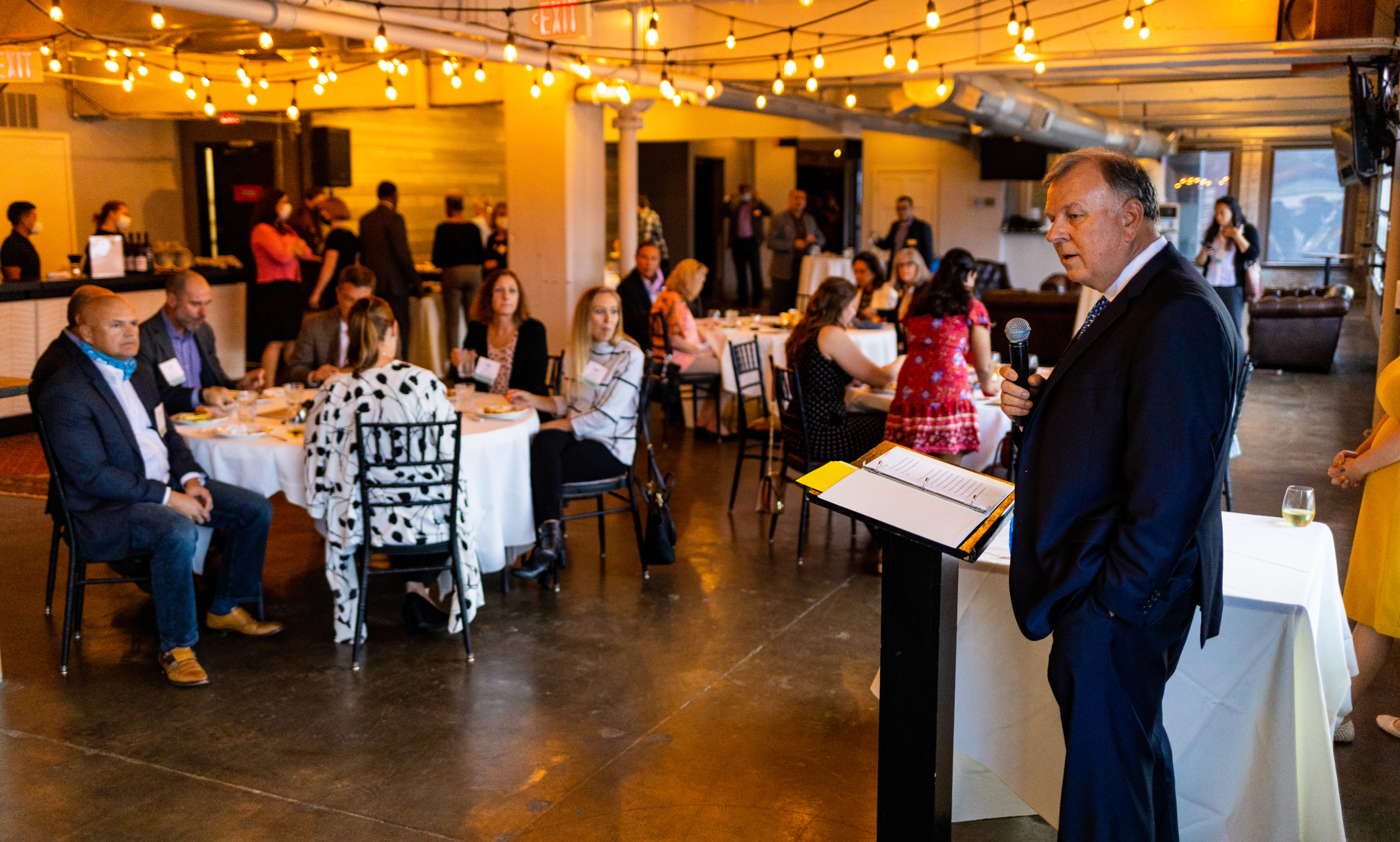
Kauffman, Sunderland foundations among this year's Vanguard Award winners
Kansas City donors, alumni and organizations were highlighted at the 2021 UMKC School of Computing and Engineering Vanguard Awards in October.
The annual award program is an opportunity to spotlight those who help expand STEM education and outreach in Kansas City.
"Our vision is to become a valued regional school of science, engineering and technology with signature professionally based education, research and community programs. I believe these award recipients are the embodiment of this vision," said Kevin Truman, dean of the school.
This year the school recognized four honorees (as well as last year's winners who could not accept their awards in person due to the COVID-19 pandemic) in the categories of SCE Young Alumni Award, SCE Supporter Award, STEM Outreach Partner and Organization of the Year.
Photo by Brandon Parigo
2021 Vanguard Award Recipients
Young Alumni Award: Riddhiman Das, BS '12, MS '19, TripleBlind.
In 2019, Das started his own company, TripleBlind. The company's mission is to build cryptographically powered 'cyber' privacy without reliance on any given legal system. Currently, they are working on building an application programming interface that will enable bulletproof privacy as a service.
Before starting TripleBlind, Das worked in Corporate Venture Capital and M&A for Ant Financial. In this role, he sourced deals in Blockchain, Artificial Intelligence, Cybersecurity, IoT Computing. Ant Financial is the financial services member of the Alibaba Group, which purchased SCE technology-based EyeVerify, now known as ZOLOZ. Prior to working for Ant Financial, Das was a product architect at EyeVerify.
SCE Supporter of the Year: The Sunderland Foundation
The Sunderland Foundation has been a strong supporter of UMKC and SCE capital project, providing one of the lead gifts for the new Robert W. Plaster Free Enterprise and Research Center and renovations within Flarsheim Hall.
Outreach Partner of the Year: Kauffman Foundation
The Kauffman Foundation is a longtime support of UMKC and the SCE, helping fund the free enterprise portion of the Plaster Center, SCE's KC STEM Alliance, student teams and more.
Organization of the Year: Black & Veatch
Black & Veatch is the largest engineering firm in the Kansas City area. It is a global engineering procurement, construction and consulting company that specializes in infrastructure development in power, oil, gas, water, telecommunications, government, mining, data centers, smart cities and bank and finance markets.
The company's support for SCE is broad and includes a major gift for the new Plaster Center, additional philanthropic support for scholarships and student teams, providing internships and hiring students and adjunct faculty for specialty areas.
Oct 13, 2021
Community group pushing to vaccinate more people on Kansas City's eastside
“We want people to feel welcomed, we want them to feel like they’re in an environment that they know, they trust, they frequent often,” said Jannette Berkley-Patton, a professor at the UMKC School of Medicine. Read more and watch the newscast.
Oct 12, 2021
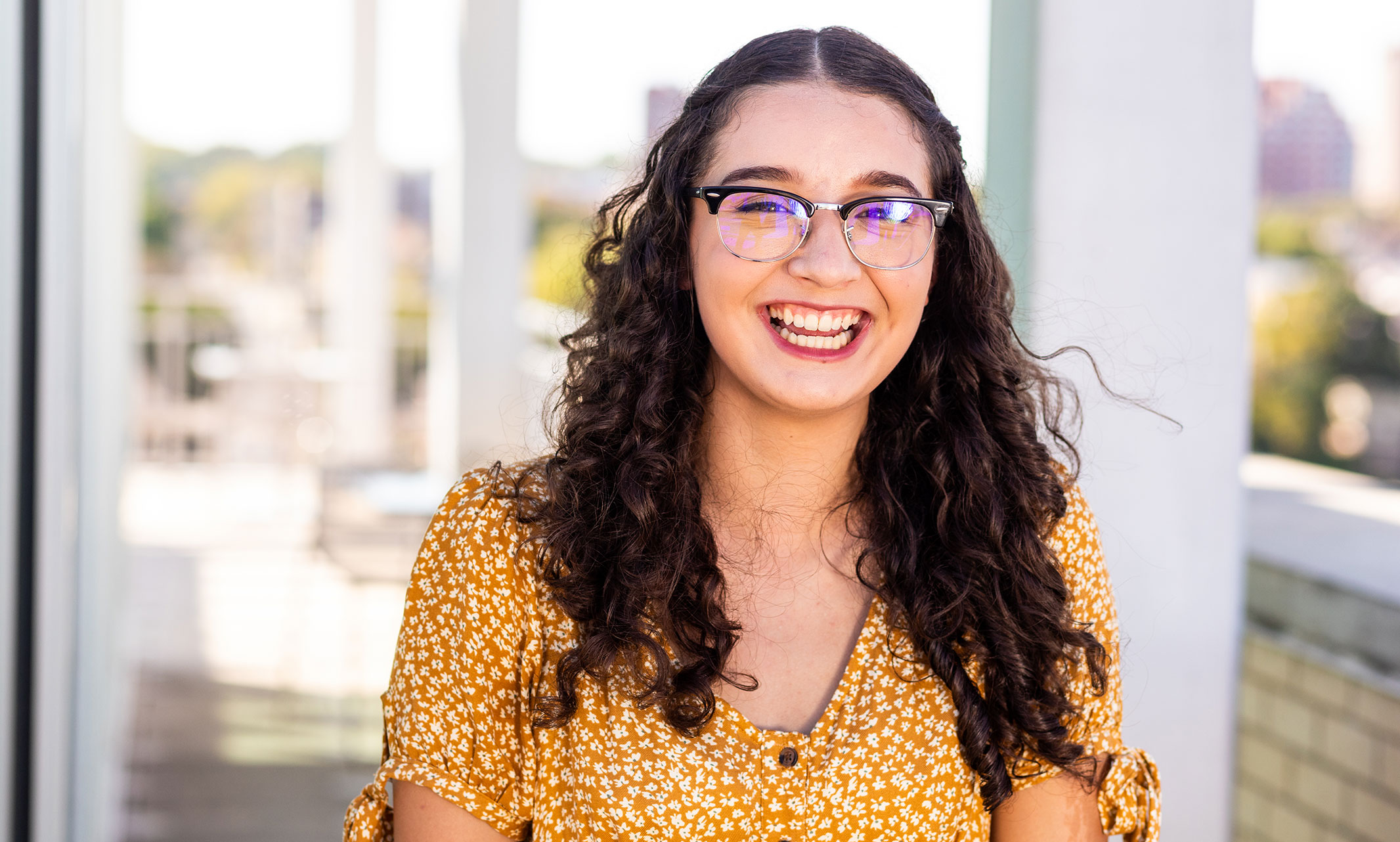
Hannah Leyva will not allow other’s expectations to define her
Hannah LeyvaAnticipated graduation year: UndeterminedUMKC degree program: University College (undecided/exploratory)Hometown: Kansas City, Kansas
Our ongoing story starts with people from around the world, converging here at UMKC. Get to know our people and you’ll know what UMKC is all about.
Hannah Leyva started her UMKC journey in 2020. A first-generation Honors Program college student, she felt a lot of pressure to go down a specific path: a biology major on a pre-medicine track.
“I came to UMKC with a set plan in mind, but it was not a reflection of my strengths or interests,” Leyva said. “My previous career goals were based around others’ expectations of me and not what I expected from myself.”
This year, Leyva is slowing down and attending the university as an undecided major. It allows her to explore her interests and ensure that her career will be one of her own making. However, this path has its fair share of struggles as well.
“The overall challenge of being undecided on your major has to do with the generalized stigma of not having your entire life planned out,” Leyva said. “The entire notion of knowing who you are and what you want to do straight out of high school is rather daunting. I think that part of going to school is learning that there is more than one way to achieve your goals, and that success is not exclusively found in a traditional path.”
"The University College is helping me determine my career goals and academic interests based on what suits me and not anyone else." - Hannah Leyva
The path less traveled is not a path one has to travel alone. Leyva has found support from students with similar life experiences as a member of the Latinx Student Union (LSU) executive board. She hopes to continue this connection by establishing a book club through the LSU.
“We are made up of first-generation students and are passionate about making a better future not only for ourselves and our families but for our community,” she said. “Listening to them talk about their stories and the obstacles they have overcome to get where they are today, reminds me that I am not alone and to keep going.”
Leyva says she has also gotten similar support from faculty and staff at UMKC as well.
“Choosing to be in the University College is helping me determine my career goals and academic interests based on what suits me and not anyone else,” Leyva said. “The team there is specialized to work with students who are uncertain about their majors and or careers. So, it is really refreshing consulting someone who actually knows how to help you.”
"I chose UMKC for the small community feel of the campus."
While she is not completely sure what her future holds, Leyva knows she is better off with this opportunity to go to school. She is a KC Scholar and a Hispanic Development Fund Scholarship recipient, which she says are a huge part of her success here at UMKC. Beyond that, she says her family and their cultural background have helped shape who she is today
“My parents are immigrants, and they have always motivated me to do well in school,” she said. “The value of education for me is immeasurable, and I really am doing this for my family, who has not had the opportunity or privilege of pursuing higher education.”
More about Hannah:
Why did you choose UMKC?
I chose UMKC for the small community feel of the campus. It is a lot more common to run into someone you know, which really made me feel more at home. I also chose UMKC for the affordability. I was fortunate enough to receive a few scholarships through the university which made UMKC more accessible.
What is one word that best describes you and why?
I would consider myself a caring person. Much of the work I have done is in the social realm, not because I am extroverted, but because I find happiness in helping others.
What’s your favorite social media channel?
I’m not sure if I have a favorite, but I do spend a lot of time scrolling through TikTok (like a true Gen Z kid).
What’s your favorite spot to eat in Kansas City?
I love Friend’s Sushi on 39th, and it’s close to a lot of cute shops so you can walk around and make a day out of it.
What’s your favorite spot on campus?
My favorite spot to hang out on campus is patio on the top floor of the Student Union. It has a really great view of the Nelson, and it’s a great place to hang out with friends or take a break from studying indoors.
Oct 07, 2021
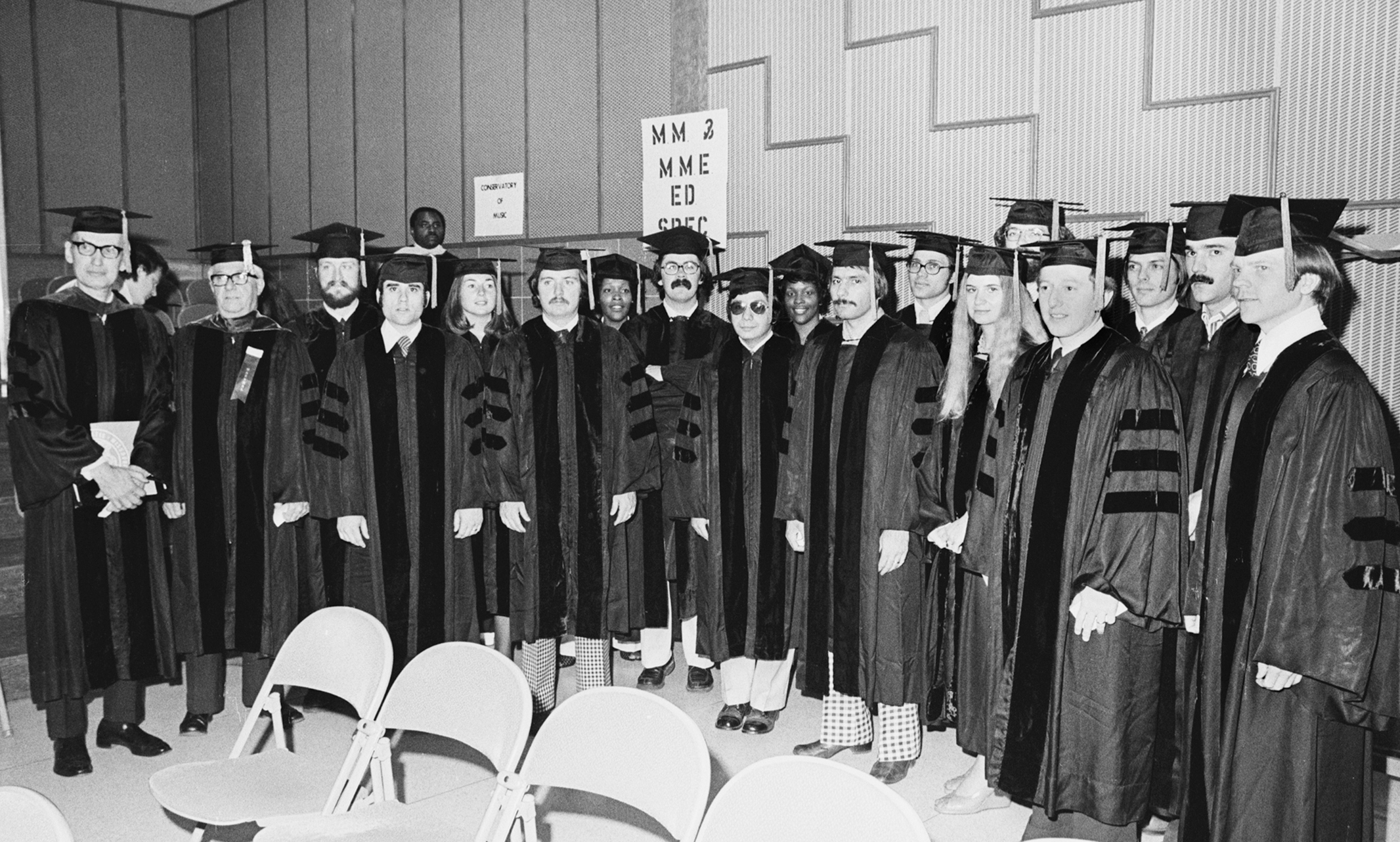
The University of Missouri-Kansas City School of Medicine is kicking off the observance of its 50th anniversary.
Fifty years ago, the University of Missouri-Kansas City launched a bold experiment in educating the medical leaders of the future.
After years of planning, more than $8.8 million in federal funding and a charter class of 18 students, the doors of the UMKC School of Medicine opened in 1971.
Fifty years later, that bold experiment is a cornerstone of Kansas City’s medical community.
This month, the University of Missouri-Kansas City School of Medicine is kicking off its yearlong observance of the 50th anniversary. A new logo, a special website and many special events will highlight the celebration. Among the key events:
A series of distinguished guest lectures, including:
Nov. 5: Roger Bush, M.D., from University of California-San Francisco, speaking on rural health inequities.
Nov. 17-19: Silvio Inzucchi, M.D., from Yale, sharing research linking type 2 diabetes, insulin resistance and cardiovascular complications.
Dec. 2: Harriet Washington, medical ethicist and Shearing Fellow at the Black Mountain Institute, University of Nevada, Las Vegas, speaking on medical apartheid.
Dec. 9: Kenneth Churchwell, M.D., from Boston Children’s Hospital, speaking on pediatric critical care (Noback-Burton Lecture).
Feb. 11: Geeta Swamy, M.D., from Duke University, speaking on maternal vaccines, COVID pregnant women, preterm delivery interventions.
Special signage around the SOM campus and 50th-anniversary themed touches for Match Day, Commencement and other signature academic occasions.
A Gold Jubilee 50th anniversary gala, set for June 4, 2022, at the Loews Hotel in downtown Kansas City.
Today as in the past, UMKC’s School of Medicine is making a difference the health and wellbeing of Kansas City communities and beyond. Long known for its innovative research, humanities-focused education and unique medical programs – namely the accelerated BA/MD program where students enter medical school straight from high school and complete their degrees in six years – UMKC continues to graduate future leaders in health care. The school has been instrumental in founding Kansas City’s UMKC Health Sciences District, where it continues to play a primary role.
“This is an exciting time for the UMKC School of Medicine, as we celebrate half a century of history and traditions,” said Mary Anne Jackson, M.D., ’78, dean of the medical school. “As our nation’s health care profession has evolved, so has the School of Medicine. We are bringing new technologies and innovations to the forefront that continue to solidify our standing as a leader in today’s medical education.”
Since 1971, nearly 4,000 physicians and health care professionals across the United States have received their degrees from the School of Medicine. Through the years, additional programs added include master’s degrees in anesthesia, physician assistant, health professions education and bioinformatics, and graduate certificates in research and health professions education. In January 2021, the school opened its second campus in St. Joseph, Missouri, with a focus on rural medicine. But it is the school’s MD programs and its docent system of learning – where faculty physicians combine the best of apprenticeship instruction with small-group teaching, mentoring, peer coaching and other techniques – that have withstood the test of time and continue to position the school as a trendsetter in medical education.
“Fifty years speaks to the longevity of the school, not to mention we have many physician leaders across the country that are graduates,” said School of Medicine alumni association president Ralph Wuebker, M.D., ’94. “There is no doubt that UMKC is a top medical school!”
Marjorie Sirridge, M.D., one of the three founding docents and later dean of the medical school, once reflected on the early days: “I remember being tired a lot and sometimes discouraged when it seemed that we just couldn’t get it all done. But, mostly I remember the challenge and the excitement of being part of a new adventure in medical education.”
Indeed, it’s been an exciting adventure the past 50 years – and the next several months will celebrate the past, present and future of UMKC School of Medicine. Join us.
Oct 07, 2021
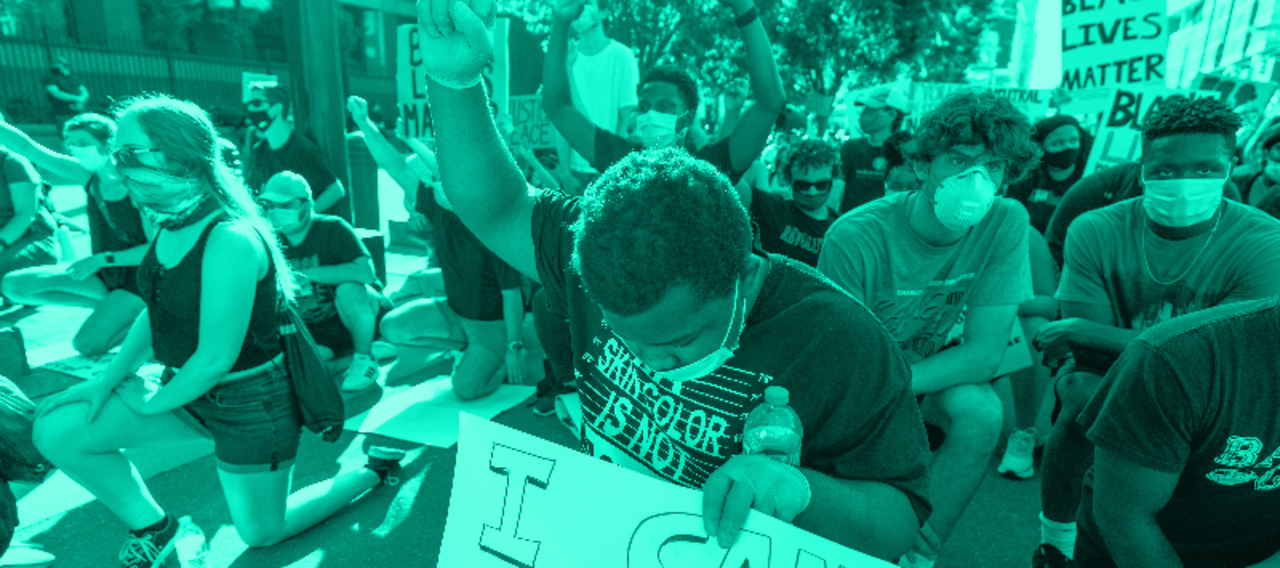
UMKC hosts discussion about the role museums play in telling the story of people of color
Art directors from across the Kansas City area participated in a virtual panel discussion on, "The Role of Antiracism Work and Healing in Museums."
The Sept. 9 was the ninth in the Critical Conversations series of panel discussions addressing systemic racism, sponsored by the UMKC Divison of Diversity and Inclusion. It was the first of the 2021-22 school year.
The museum-oriented discussion was in collaboration with The Nelson-Atkins Museum of Art.
UMKC people are taking thoughtful action on campus and in our community to ensure lasting and comprehensive changes through Roos Advocate for Community Change, a campus-wide effort announced in June 2020.
Critical Conversations are part of that initiative. The goal of each discussion is to enlighten, educate and explore the causes and potential cures for racism. Attendance to the discussions is free.
Panelists for the session include:
Gary O'Bannon (moderator), executive in-resident, UMKC Henry W. Bloch School of Management
Rashida Phillips, executive director of the American Jazz Museum of Art
Julian Zugazagoitia, director and CEO of The Nelson-Atkins Museum of Arts
Glenn North, executive director of the Bruce R. Watkins Heritage Center
Matthew Naylor, president and CEO of the National World War I Museum and Memorial
Anna Marie Tutera, director of the Kansas City Museum
Excerpts from the conversation are below. To view the complete recording of the conversation, click here.
Anti-racism and how it's discussed in the museum field
Tutera: We are defining anti-racism as a conscious decision and commitment to fight against racism on every level and on every aspect. Institutionally, we are looking at policies and procedures and practices within the museum that have contributed to racism, caused it and perpetuated it.
Lack of diversity among museum staff and board members
Tutera: You cannot have an all-white or majority-white staff or an all-white or majority white board and make any significant change. You cannot serve a diverse community without looking internally first. You can't commit to anti-racism until you take a deep dive into your own history of staffing and history of board leadership.
Zugazagoitia: If people do not see themselves in museums, then museums will become irreverent.
Naylor: Having a board that argues for us to be an institution for all is important. A board that wants to give a voice to the LGTBQ community, African American, Indian American, the place of women, raising those issues allows those issues to be express to the public. Board leadership, if it's an expression of the DNA of the organization, even though there is still is a gap and we are still not where we ought to be, can still make a world of difference.
Holding people accountable
Phillips: We really have to get back to people-to-people, really deep dialogue. This is not only a space for worship and entertainment, but it's a space where we come together. It is the kitchen and we've got to realize that there's some beautiful responsibility and energy in going into a museum and seeing an exhibition and enjoying the takeaway from that. It's deeper than that.
Support needed in museums
North: Sometimes it's hard to have partnerships. Sometimes it boils down to personality differences and complicated histories between organizations and it's difficult. Sometimes when you don't have the right intention things can get diluted.
Oct 06, 2021
Why we label ordinary objects as too special to use
UMKC Henry W. Bloch School of Management associate professor Jacqueline Rifkin wrote about her research on what she calls the specialness spiral- the accumulation of things without using or getting rid of them. Read more.
Additional news coverage:
“Specialness Spirals” - How Non-Consumption Can Drive Clutter - BYUradio
Oct 06, 2021
Could anti-vaxxers fuel a spike in childhood diseases?
Mary Anne Jackson, dean of the University of Missouri-Kansas City School of Medicine and a former member of the National Vaccine Advisory Committee and the American Academy of Pediatrics Committee on Infectious Diseases spoke with Newsweek about the potential for anti-vaccine rhetoric to spur an increase in vaccine-preventable disease in children. Read the news:
Anti-Vaxxers Could Fuel Spike in Childhood Diseases: 'It Will Be Horrific' - Newsweek
Anti-Vaxxers Could Fuel Spike in Childhood Diseases: 'It Will Be Horrific' - MSN
Oct 06, 2021
A local's guide to Native American cultural sites around Kansas City
The UMKC Gallery of Art is currently hosting an exhibition by Gregg Deal. “Yadooa Hookwu (I Will Speak Now)” explores “Indigenous identity through multiple forms of expression.” Deal (Paiute Tribe of Pyramid Lake) is a multi-disciplinary artist who addresses race relations, American history and Indian stereotypes in his work. Read more.
Oct 06, 2021
KCINNO reports on successful E-Scholars innovations
E-Scholars is an accelerator program at the University of Missouri-Kansas City that’s tailored for early-stage ventures. Most program participants are at the idea stage and need guidance in launching. Others are looking for a systematic growth plan. Since the first class in spring 2011, about 300 ventures have completed the program, including RFP360, Lending Standard, Integrated Roadways and Strange Days Brewing. Read more.
Oct 05, 2021
Kansas City doctors explain why it might be time for some to get a Pfizer COVID-19 booster shot
Local Kansas City metro area hospitals are starting to give Pfizer booster shots to those that want them. UMKC medical student Geethanjali Rajagopal says most of her patients are in the ICU with COVID-19. She says it’s what prompted her to get her booster shot Tuesday. Read more and watch the newscast.
Oct 05, 2021
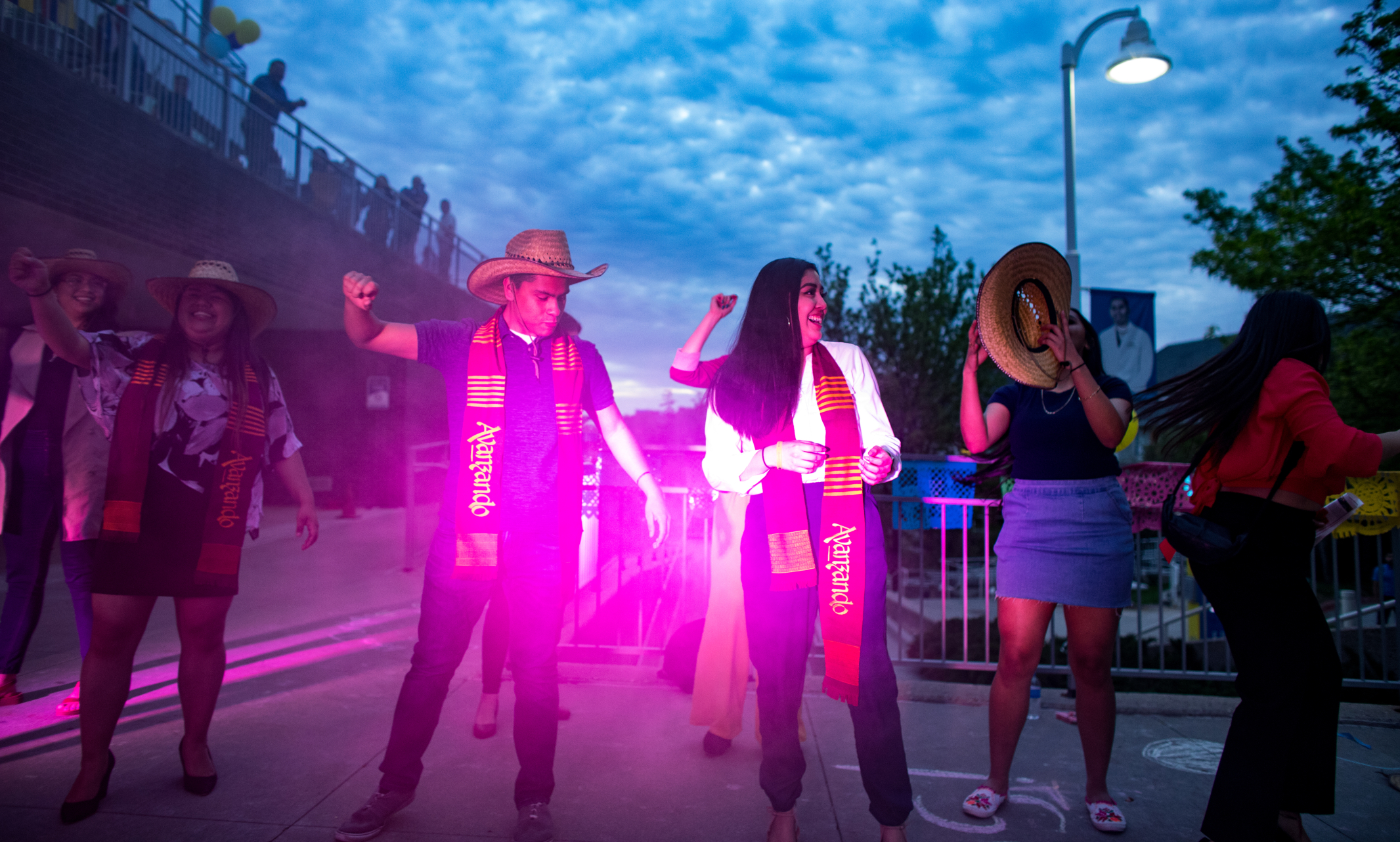
Launched in 2011, the program currently serves 150 students
Avanzando, a support and resource program for Latinx students at the University of Missouri-Kansas City, will celebrate its 10-year anniversary this year.
A decade ago, many Latinx students at UMKC felt they lacked a sense of belonging on campus and personal relationships with role models in the professional world for them to emulate. As a result, Avanzando was born.
"There was a clear need to support the growing Latinx student population, not only academically but also professionally, after graduation," said Alberto Villamandos, one of the founding mentors for the program. "We knew a membership program with Latinx and Hispanic faculty and the KC community was the way to go. Representation matters, and feeling that there are people who understand what you are going through as an undergraduate student, and who you can share your achievements with, was, and still is, critical."
The program began as a partnership between the UMKC Divison of Diversity and Inclusion and the Hispanic Development Fund. In 2017, the program transitioned to the Office of Multicultural Student Affairs, where it has expanded from only serving Hispanic Development Fund scholars, to any Latinx students interested in being served through the program.
Avanzando works to communicate to Latinx students that there is a place carved out for them at UMKC through supporting, mentoring resources and connections to help them do well in school, graduate and find success in their careers.
Goals of the program include increasing student retention, improving graduation rates and assisting in successful transitions of students into graduate school and/or career positions.
An Avanzando student reads from a 'career development guide' at a meeting in 2012. Photo by Brandon Parigo.
"The program started with 27 original members," said Ivan Ramirez, coordinator for the UMKC Multicultural Student Affairs Department and the Avanzado program. "In 2016, we had grown to 73 scholars, and then it grew to its biggest size of 260. Right now, we are at 150 scholars and we serve them just as well as we were serving the original 27."
Avanzando mentors are volunteers from UMKC faculty and staff, as well as community members with no ties to the university. Students are matched to mentors based on common goals and career interests and meet regularly with mentors throughout their time at UMKC.
Mentors offer students academic support, promote their cultural identity development and enhance access to resources and networks in the professional world.
"There is a wide range of mentors. We have lawyers, CEOs, doctors, dentists," Ramirez said.
"I think it's important for (students) to have somebody to talk with that looks like them, that has been through what they are going through. I am a first-generation (college graduate), so when they come talk to me and tell me their stories, I can relate to them, I've been in their shoes. That's what being a mentor is, it's so valuable to have someone that looks like you say, 'hey I've been there, I get it."
Villamandos said he feels proud of the success that Avanzando has seen over the years. He said that he is still in contact with many of the original members of the program as well as students he has mentored over the years.
"We are a family. That tells you how meaningful this program is to mentors and mentees alike," Villamandos said. "The academic and professional support has been proven, with great retention rates and so many students who went into grad school and great jobs."
Oct 04, 2021
UMKC graduate continues her service.
Experienced Educator, Ann McCoy, Named College of Education Dean at UCM Ann McCoy, Ph.D., a UMKC graduate with a Ph.D. in Curriculum and Instruction (mathematics education), will be working to make a positive impact on the preparation of tomorrow’s teachers and school administrators as the new dean of the College of Education (COE) at the University of Central Missouri. University Provost and Vice President for Academic Affairs Phil Bridgmon, Ph.D., this week announced McCoy’s appointment, continuing her service in the position in which she has served since May 2021 on an interim basis.
Oct 04, 2021
